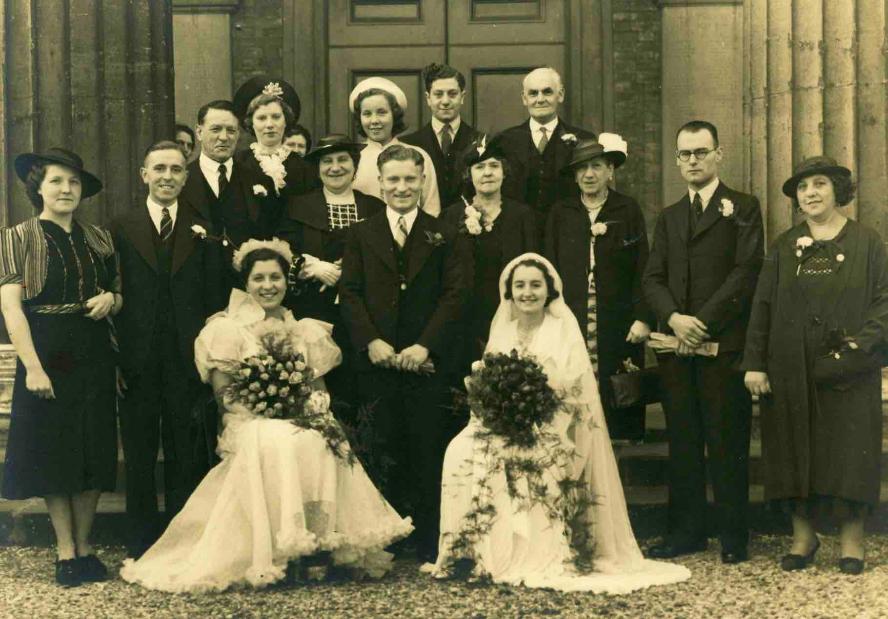The Hamshar Family Story 1907-1938
photograph c 1918
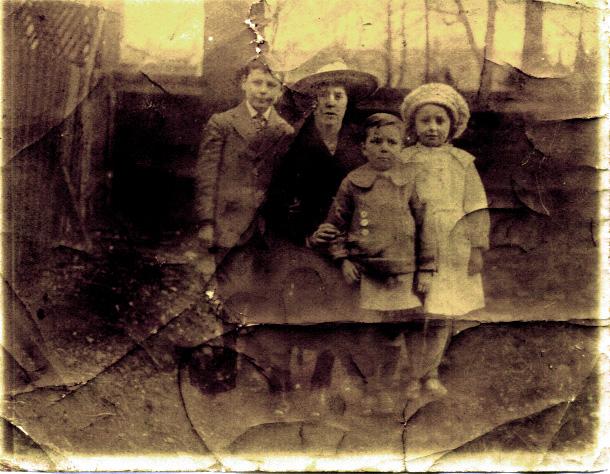
I have no photos that show the whole Hamshar family, mainly because of the untimely demise of Ernest Hamshar. This photo taken around 1918 shows Bella with her two children Ernie (to her right) and Helen. The younger boy at the front is Bert (the son of Bella's sister) whom Bella adopted in 1917 after he was orphaned. (Thanks to Mike Hoare for his enhancement of this photograph which was badly faded.)
This volume is the story of the Family of Ernest and Bella from their marriage on 8th September 1907 until the marriage of their daughter Helen, on 3rd September 1938. It is told in the voices of Bella, Ernest and Helen with each narrator having text of a different colour and their age given with the date at the top of each entry. The diary entries are built around stories told to me directly by Helen and documentary evidence.
Later entries focus on Helen's story as she was my only source.
September 8th 1907 - Bella (22)
Ernie and I were married. [Certificate and full details in Bella's story.]
April 11th 1910 - Bella (25)
My
sister, Nell’s little girl Sarah has died.
She was only 10 years old.
Belle’s sister, Helena Hale married Tom Fish in 1893. They had several children including Sarah, Tom, Lillian, Maggie, Elena and Louisa - see 1931. I do not know what Sarah died from.
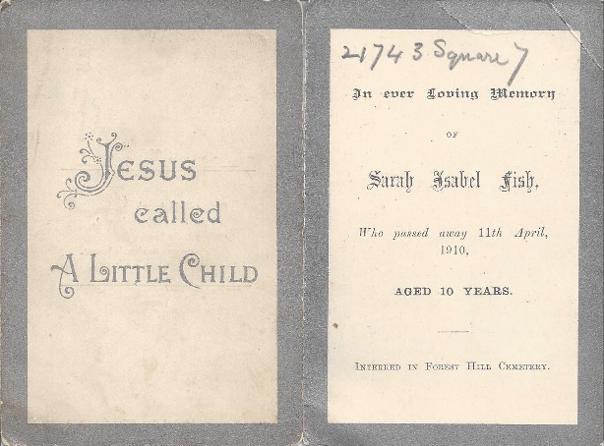
1910 - Bella (25)
In February this year my brother Charlie emigrated to Australia. He did a drawing of little Ernie (from his photograph) before he went and gave it to me as a parting gift. He is hoping to set up a package making company in Australia.
Bella’s brother, Charlie Hale emigrated in 1910. He married Margaret (Maggie) - the child in the photograph is presumably their first born – possibly Margaret.
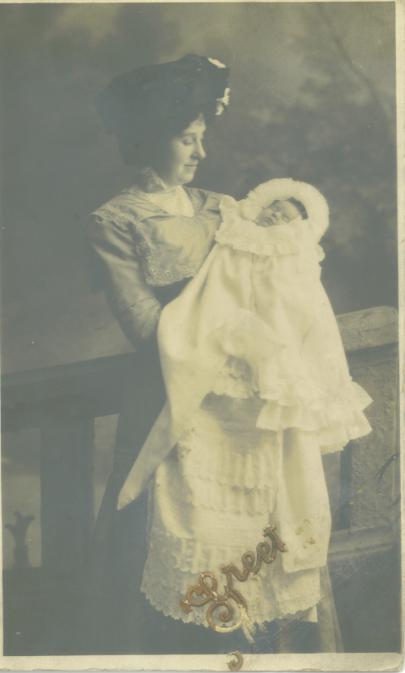
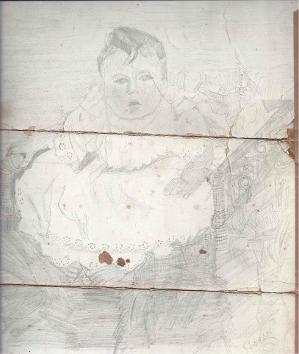
Drawing of Ernie by Charlie Hale – it is annotated at the foot ‘GIVEN IN REMEMBRANCE OF MY VOYAGE TO AUSTRALIA FEB - MARCH 1910’ and signed in capitals ‘C. HALE’.
This is the photograph used as the basis for Charlie’s drawing.
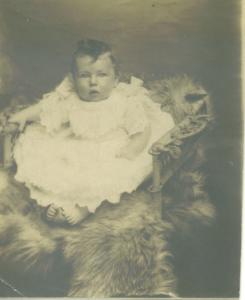
February 3rd 1911 - Bella (27)
Today my lovely little girl Nellie was born at our home in Cambridge Street Kennington. I was attended by Mrs Smith the local midwife and had a fairly easy time, much easier than I had when Ernie, our first, was born two years ago. Nellie is adorable. She has brown hair and dark eyes and everyone says she look just like her Dad.
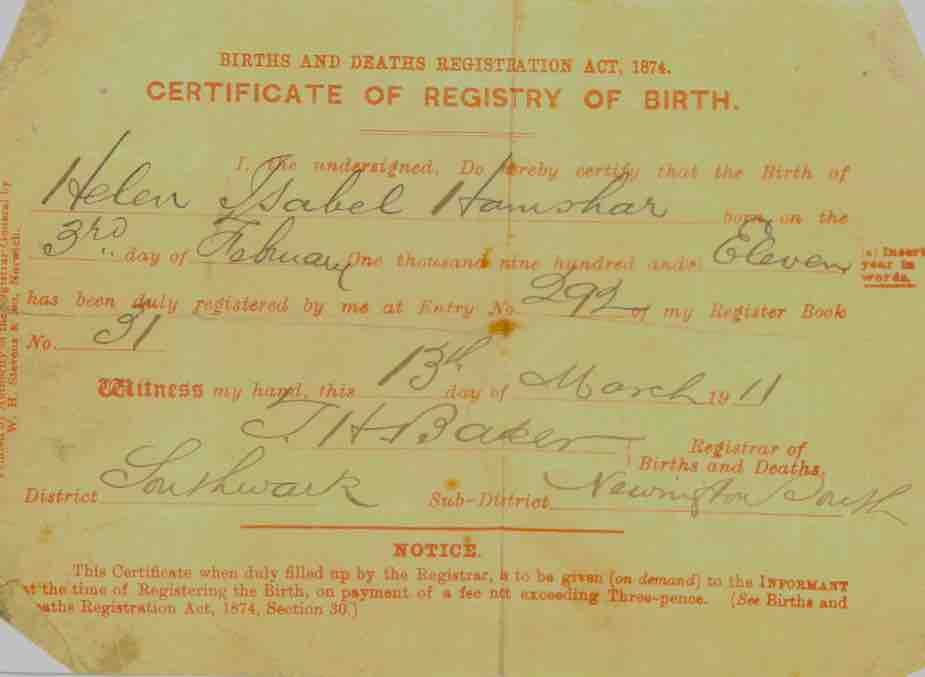
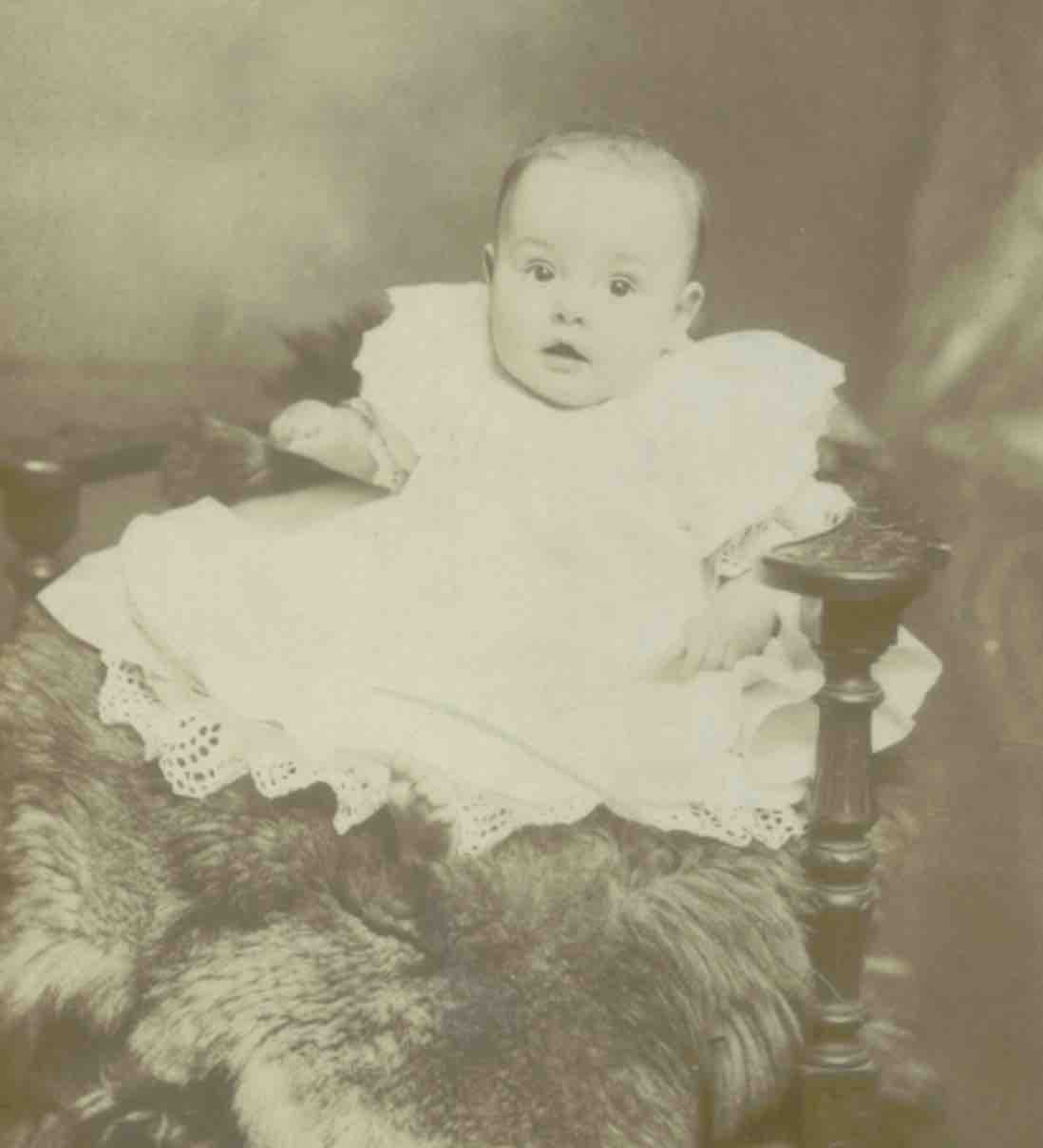
1911 Census - Hale Hamshar Family
The 1911 Census shows the Hale/Hamshar family as a close knit group all living in a small area of South London.
Bella and Helen were to remain here for the rest of their lives and although Helen’s sons moved away (one as far as Canada), over 100 years later, in 2017, her granddaughter bought a house in Brockwell Park Gardens – between West Norwood and Herne Hill.
When Bella was a girl in the 1890’s her mother, Helena Hale worked as a cleaner in the grand house in Brockwell Park. Bella would often go with her mother and knew the park well. Many years later she told her daughter that her aspiration was always to live in Brockwell Park gardens – an objective achieved 3 generations later!!!
1911 - Ernest (27)
I am always very tired when I get in from my milk round in the afternoon and I usually doze off in the rocking chair cuddling our baby, Nellie. Well today we both got a bit of a shock because as I sat down with her in my arms the chair collapsed and we both ended up on the floor. Neither of us was hurt thank goodness but the chair is beyond repair and we shall need to buy a new one. I’ve a fancy for a wooden armchair next time.
This story is from Helen. Ernest worked for Higg’s Dairy in Grosvenor Street, Camberwell. The poor quality picture (taken from a book but I can’t remember which) shows milkmen from Bacon’s Dairy in Elder Road, West Norwood around 1912. Kit and attire is typical of a London milkman of that period. Some carts are horse drawn, some pushed by hand.
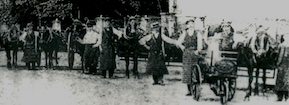
December 25th 1911 - Bella (27)
My sister Lou was married to Bert Wooddeson.
A marriage on Christmas Day seems strange now but in the past Christmas Day and a few other religious days were the only days of the year that most workers had a full day off. Marriages and multiple christenings were thus planned for that day so that all the family and friends of the couple could attend.

1913 - Ernest (29)
I started my new job today, working as a storekeeper for the British Motor Cab Company in Kennington. Fred (Bella’s brother's son) has been working here for some time as a clerk and put in a good word to help me get the job.
Photo shows employees of the British Motor Cab Company - Ernest is 4th from the left top row and Fred seated first left bottom row.
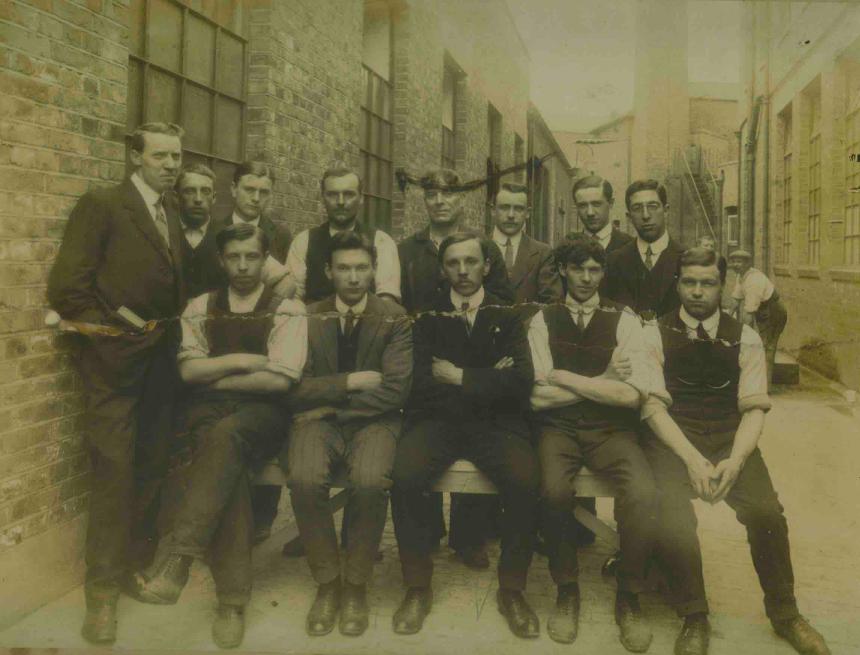
26th May 1915 - Ernest (31)
I have been sent into action in Western France.
I cannot find any information about when Ernest first enlisted or was conscripted but this record of his award of the Victory Medal - found online through Ancestry - shows that he first entered the theatre of war of Western France on 26th May. It also has the date of his death see below for details.
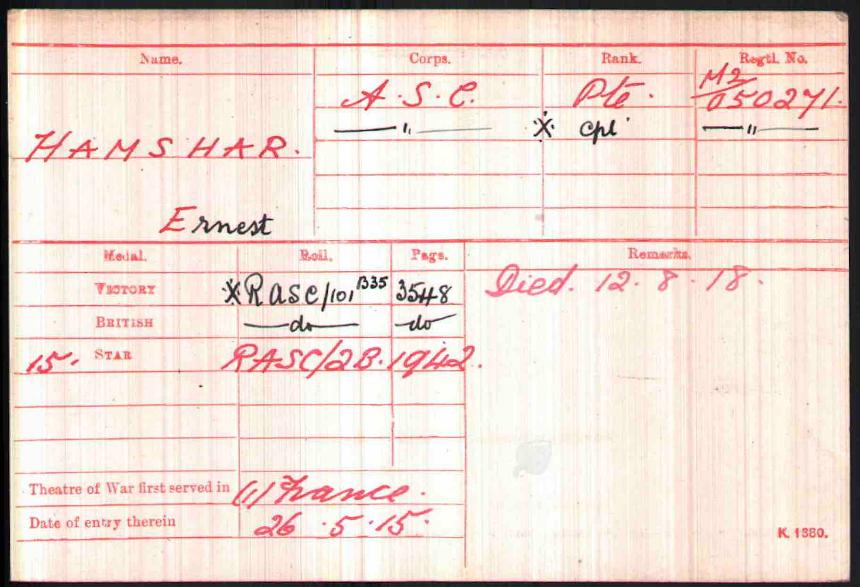
December 1915 - Ernest (31)
Last night we put on a show for Christmas. I accompanied the singers on piano and was also in a sketch. It has been great fun putting the show together and it has really helped to keep our spirits up this Christmas away from home.
I am serving with the Mechanical Transport Corps in Rouen. After our training at Grove Park we came over here in May on The Viper, and here we have been ever since. I have made some good friends but I miss Bella and the children so much.
The show programme below is very faded but shows Hampshire (misspelling) playing Lattontin (p1) and Pte Hamshire Pianist for the whole show (p2). The photograph which shows Ernest standing 4th from left is on the front of the postcard dated Aug 1915. This was sent to Bella (note that Ernie calls her Bell) to say that he had received no answers to his letters.
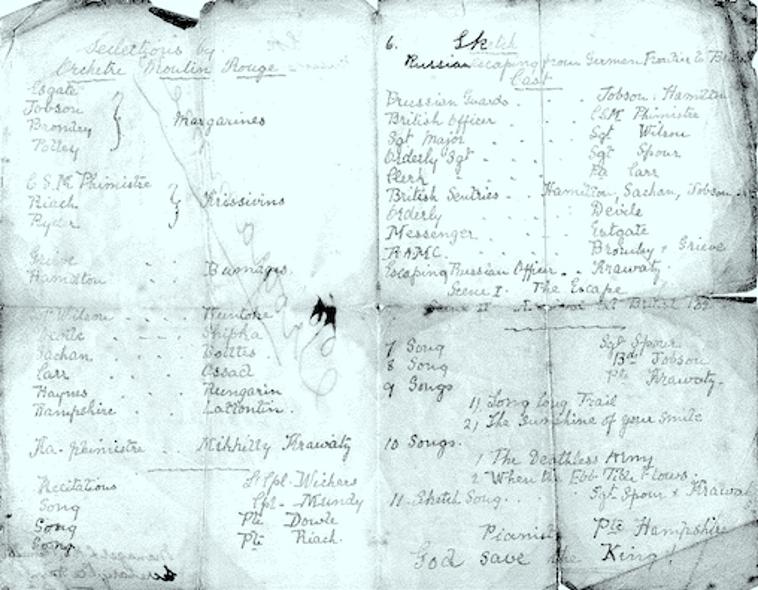

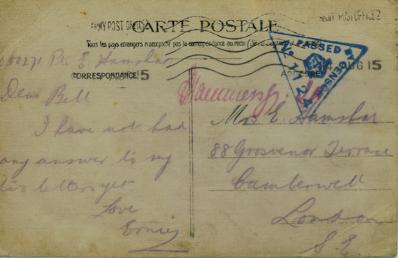
1916 - Bella (32)
Ernie has been a real pest today. I took Helen, Ernie and Bert on a bus up to Norwood to visit Grandma Hamshar who runs the laundry in Norwood Road. We often go there on a Sunday for our tea. I had just got them all ready when Ernie, who was wearing his best sailor suit went out into the garden under the tree at the back and got a bird dropping all over his shoulder. He got his first slap for that! I sponged it off but the clip that fastens his boater to the back of his coat never got done up again. We always ride on the top of the bus because Ernie gets sick inside and just as we had got sat down his boater blew off and away into the road. We had to get off and go back for it and then wait for the next bus. He got another slap for that!
This is another story from Helen. The photo shows Bella with Helen and Ernie with ernie wearing his sailor suit - a common "best" outfit for young boys at the time. It is a studio photograph by H Boyd, Art Photographer, 283 Camberwell Road, SE.
1916 September - Bella (32)
Nellie started school today. She goes to the same school as Ernie, John Ruskin School in Camberwell. They will be together in the infants for a year which will help Nellie to settle before Ernie goes up to standard one next year.
The pictures below are of the prize certificates awarded to Helen in the years 1917-1919. Note that the later two call her Nellie. She was known as Nellie for most of her life but never liked the name. As the certificates state, these were temporarily being awarded instead of the more expensive medals and prizes.
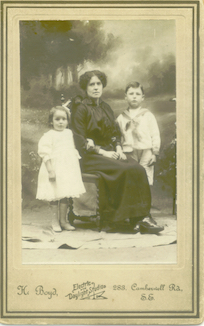
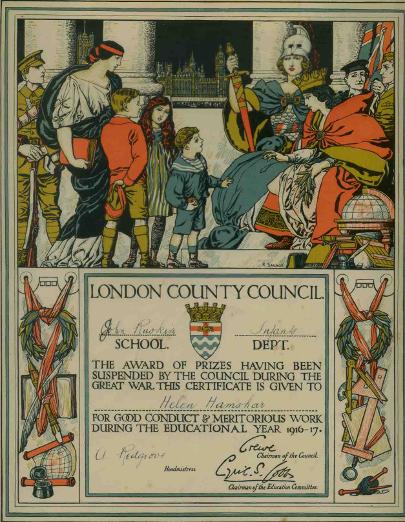
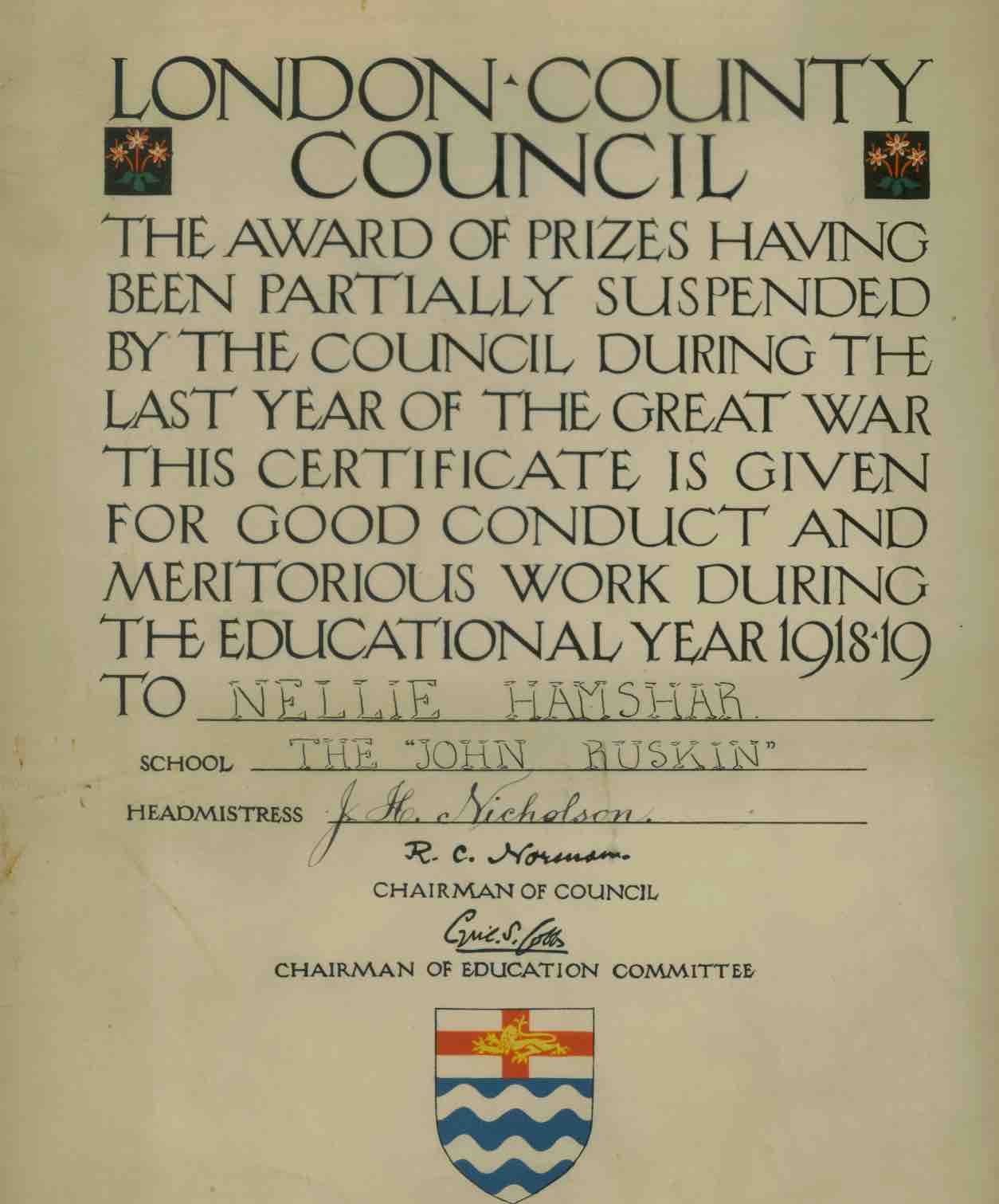
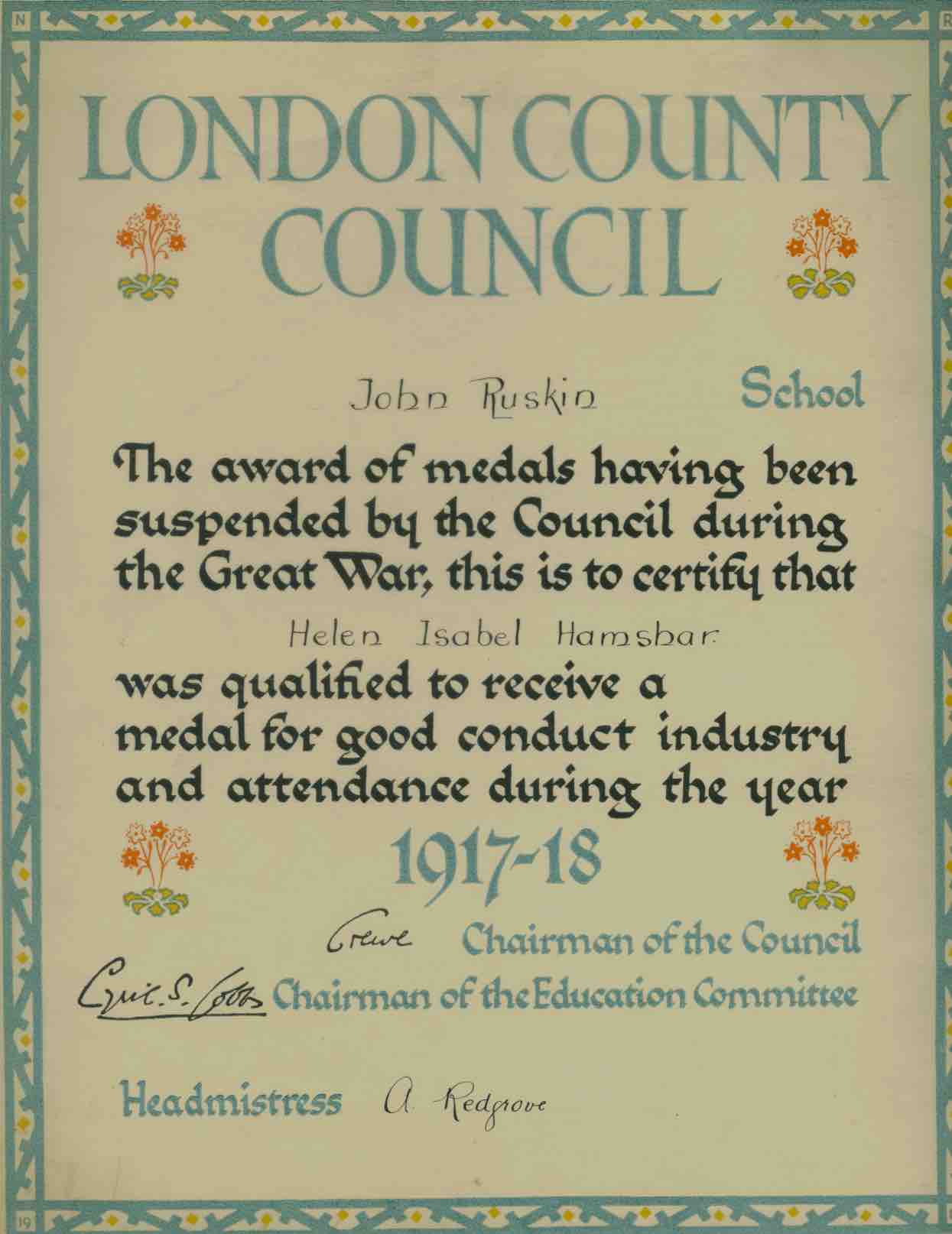
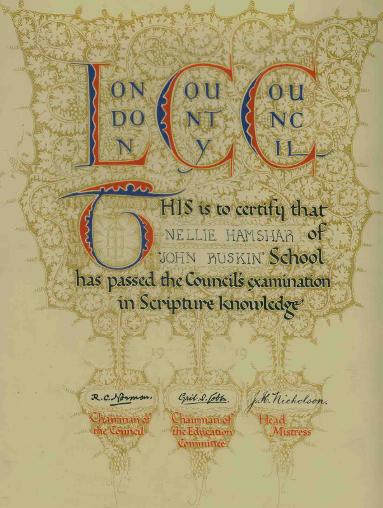
1916 - Bella (33)
This evening Lou and I went to the cinema. We were watching the Pathé News and it was all about the war. Suddenly Lou jumped up and shouted out ‘That’s my Bert!’ She had seen him on the screen fighting on the Somme. She was so upset that we had to go home and miss the main feature.
The bombardment on the Somme must have been terrible. It’s bad enough when we get the bombs over here. Each time the siren goes I push Ernie and Nell under the table and hope for the best. Ernie takes it very badly. One time he came out all blue around the lips, which was very frightening. I took him to the doctor who said he has a weak heart and has referred us to King’s College Hospital.
There was no TV of course so the only film of the war was the Pathé News in the cinema - always shown before the main feature film. This was the last Lou ever saw of her husband who was killed on the Somme in September 1916. The service record for Herbert Wooddeson shows the following core information. It is an extensive record that also contains some interesting correspondence between Bella and the Infantry Records Office about medals - see 1921.
|
Corps |
11 Br Royal West Kent |
|
Regiment number |
10674 |
|
Name |
Herbert Leslie Wooddeson |
|
Address |
88 Grosvenor Terrace, Camberwell |
|
Age |
27 years 6 months |
|
Trade |
Milkman |
|
Attestation Date |
3rd November 1915 |
|
Height |
5 feet 4 ¾ inches |
|
Chest Measurement |
36 ½ inches - expansion 3 inches |
|
Next of kin |
Louisa Mary Ann Wooddeson - wife 88 Grosvenor Terrace, Camberwell |
|
Marriage |
Louisa Mary Ann Hale St Paul’s Church Newington, 25 December 1911 88 Grosvenor Terrace, Camberwell |
|
Children |
Herbert Frederick Robert Wooddeson 19th Dec 1912 Southwark |
|
Statement of the Services |
Joined at Catford on 3/11/15 Posted Pte 3/11/15 Appointed L/Cpl 16/5/16 Appointed A/Corporal 10/5/16 K in Action A/Cpl 15/9/16 |
|
Total Engagement |
to 15/9/16 (date of death) 318 days |
|
Medical History |
Examined 25 the October 1915 Physical development good Vaccination marks - 2 - left arm in infancy Vision RE 6/6 LE 6/6 Defects - Slight ff left (flat foot) |
|
Casualty Form |
Enlisted 3/11/15 Term of Service - Duration of war Date of appointment to Lance rank 16/5/16 Appointed (in the Field) Paid L/Cpl to complete establishment 16/5/16 Appointed Acting Cpl - 10/5/16 Killed in action - 15/9/16 |
There are also records of his death in action in Flanders on 15th September 1916 and the location of his grave at Thiepval Memorial Cemetery, Department de la Somme, Picardie, France.
November 1916 - Bella (32)
I have just been to see Ernie in hospital. He is in Ward R4 of the 4th London General Hospital. They won’t allow the children to visit so I have been leaving them here with Lou. He has not been injured, thank God, but is suffering with carbuncles on his neck, which are very painful and have made him very sick. He will be discharged tomorrow but he won’t be allowed home and has to go straight to Folkestone so I shan’t see him again before he goes back. It seems terrible but I keep wishing there was something more serious wrong so that he wouldn’t have to go back at all!
The photograph shows Ernest with others in the London General. He is in the back row right hand side with cap and collar up to hide bandage. Eight of the others in the photograph are listed on the back but it does not say who is which. The official letter about what to do when discharged from hospital is dated 9 November 1916. Both photograph and letter have holes in as they were in his breast pocket when he was killed (see below).
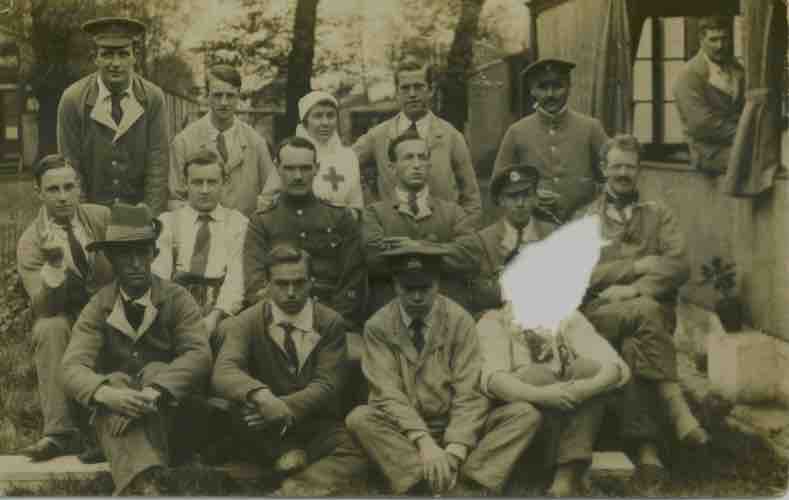
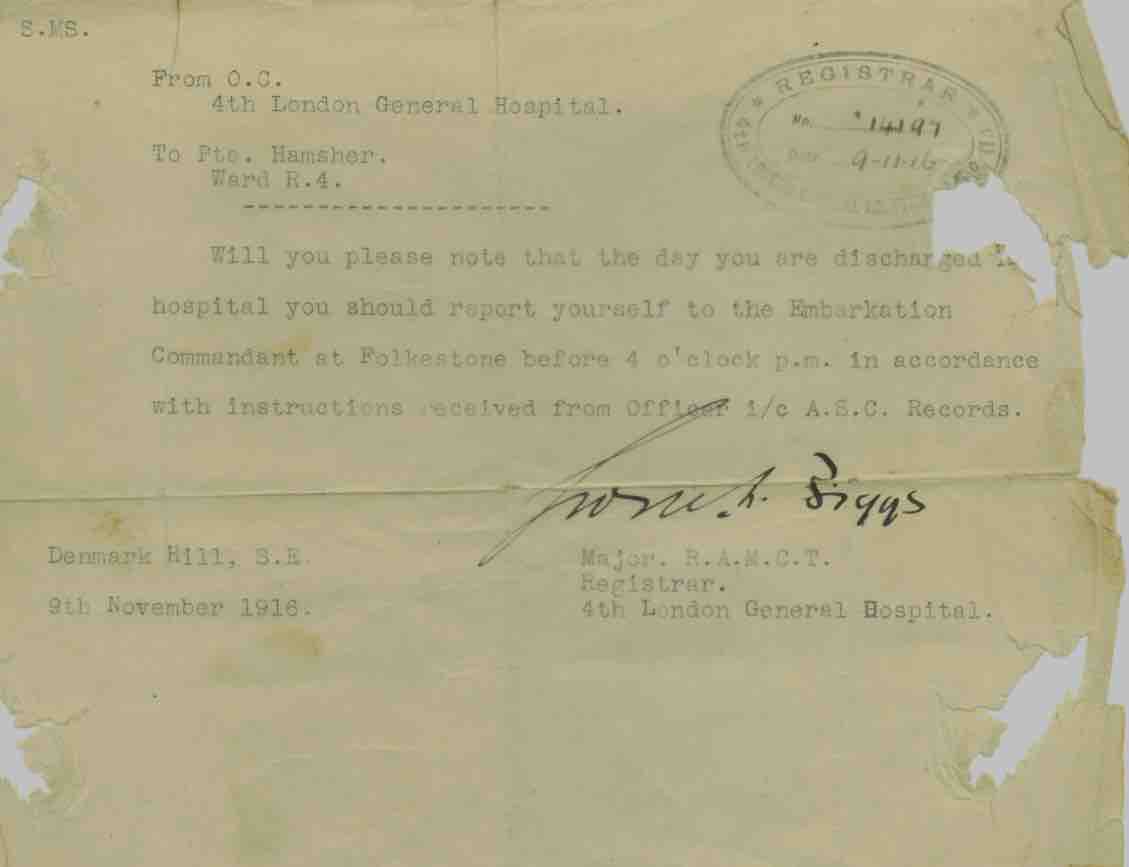
March 1917 - Ernest (33)
I wrote to my father because a group of us are thinking of starting an orchestra. The Transport Corps already has a great band in which I play the fife but we’d like to have a go at a greater range of instruments. I received Father’s letter in reply. He has suggested that I should either get hold of a clarinet or learn to conduct or both. I will have to ask around to see what I can get. Father said that Harold is getting worse. He is in Cane Hill with creeping paralysis. I hope he lasts until I get home to see him again.
This is the text of the letter - with original errors uncorrected. The original can be downloaded from here.
1/3/17 16 Pyrmont Grove, West Norwood, S.E.
Dear Ernest
![]()
![]()
![]()
![]() Yours to hand very pleased to hear from you. About
your orchestra the Tenor Horn is not used in orchestras only French Horn you
might have a Saxhorn in E flat and F. that is you would have a crook with
it. as you have been playing the Fife I
should think a Picolo of Flute would be better I do not think it would take any
longer to play 2nd Clarionet then any other instrumet if you want to go in for
any solo instrument it takes a long time what I should do if you can get a
Clarionet is to learn that. in the mean time you can take up the conductorship
of the Band that has to be practiced as
much as learning an instrument no one is
a born conductor you can practice
conducting by yourself by beating time to any one playing the Piano or any
other instrument or clock. I suppos you
know how to beat four in a bar down one
to the left one to the right and one
up a conductor wants to look well over the score or conductors part for
the diffrent movements and diffrent times and where the principle instruments
come in. I am sending you the Musical
Catechism it will take a lot of study for conducting but I dont see why you
could not do that and learn the Clarionet the same time I can get you a Clarionet Tutor if you want
one anything you want to know I should be very please to tell you if I can. I dont think I have any more to say all is
well here Mother as just come back from
seeing Harold and he gets worse
Yours to hand very pleased to hear from you. About
your orchestra the Tenor Horn is not used in orchestras only French Horn you
might have a Saxhorn in E flat and F. that is you would have a crook with
it. as you have been playing the Fife I
should think a Picolo of Flute would be better I do not think it would take any
longer to play 2nd Clarionet then any other instrumet if you want to go in for
any solo instrument it takes a long time what I should do if you can get a
Clarionet is to learn that. in the mean time you can take up the conductorship
of the Band that has to be practiced as
much as learning an instrument no one is
a born conductor you can practice
conducting by yourself by beating time to any one playing the Piano or any
other instrument or clock. I suppos you
know how to beat four in a bar down one
to the left one to the right and one
up a conductor wants to look well over the score or conductors part for
the diffrent movements and diffrent times and where the principle instruments
come in. I am sending you the Musical
Catechism it will take a lot of study for conducting but I dont see why you
could not do that and learn the Clarionet the same time I can get you a Clarionet Tutor if you want
one anything you want to know I should be very please to tell you if I can. I dont think I have any more to say all is
well here Mother as just come back from
seeing Harold and he gets worse
from your
affactional Father W G Hamshar
1917 - Helen (6)
I was playing with two of my friends on the steps outside our house (88 Grosvenor Terrace) when a cab arrived and a soldier got out. Mum had just done the steps and when she came rushing to the door I thought she was going to tell us off for messing them up. But she didn’t, she said,
‘Nellie, Don’t you know your Dad?’
I hadn’t recognised him and I felt a bit shy talking to him at first but we’ve made up for it since. It is lovely to have my Dad home.
We all went round to look at where the bomb fell two weeks ago (just off Albion Road). Some of the houses there are very badly damaged. Mum said the King and Queen came to look at the damage. I wish I could have seen them.
In the evening we went to Brixton to see Auntie Rose and Uncle Will. On the way back I rode on my Dad’s shoulders. The siren sounded and we ran into the school (John Ruskin) for shelter until the All Clear went. We were lucky. There were no bombs near us today.
Tomorrow Dad is going to take us to the Music Hall in Kennington Green. I am so excited. It is lovely having my Dad home!
This is the first of Helen's recollections recorded in her own voice.
My sister Lou died today in the Brook Hospital Kennington. She had a cancer of the stomach and has been ill for a few months. Her husband was killed last year on the Somme and so poor Bert is now an orphan at the age of only 4. I promised Lou that I would look after him and so now I have three children.
The photo shows Bella (left) with Ernie and Helen standing next to her and Lou with Bert on the right.
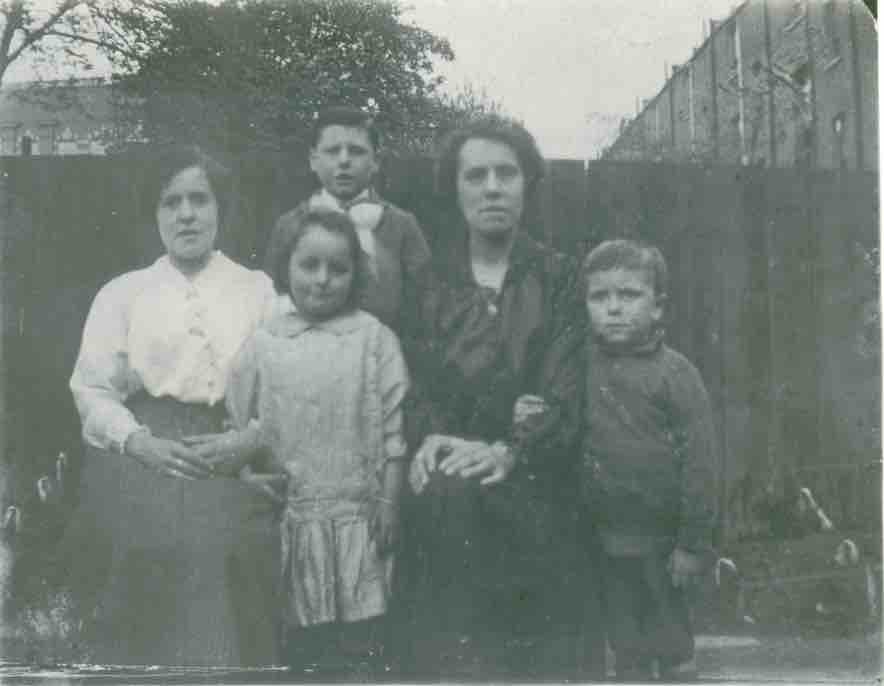
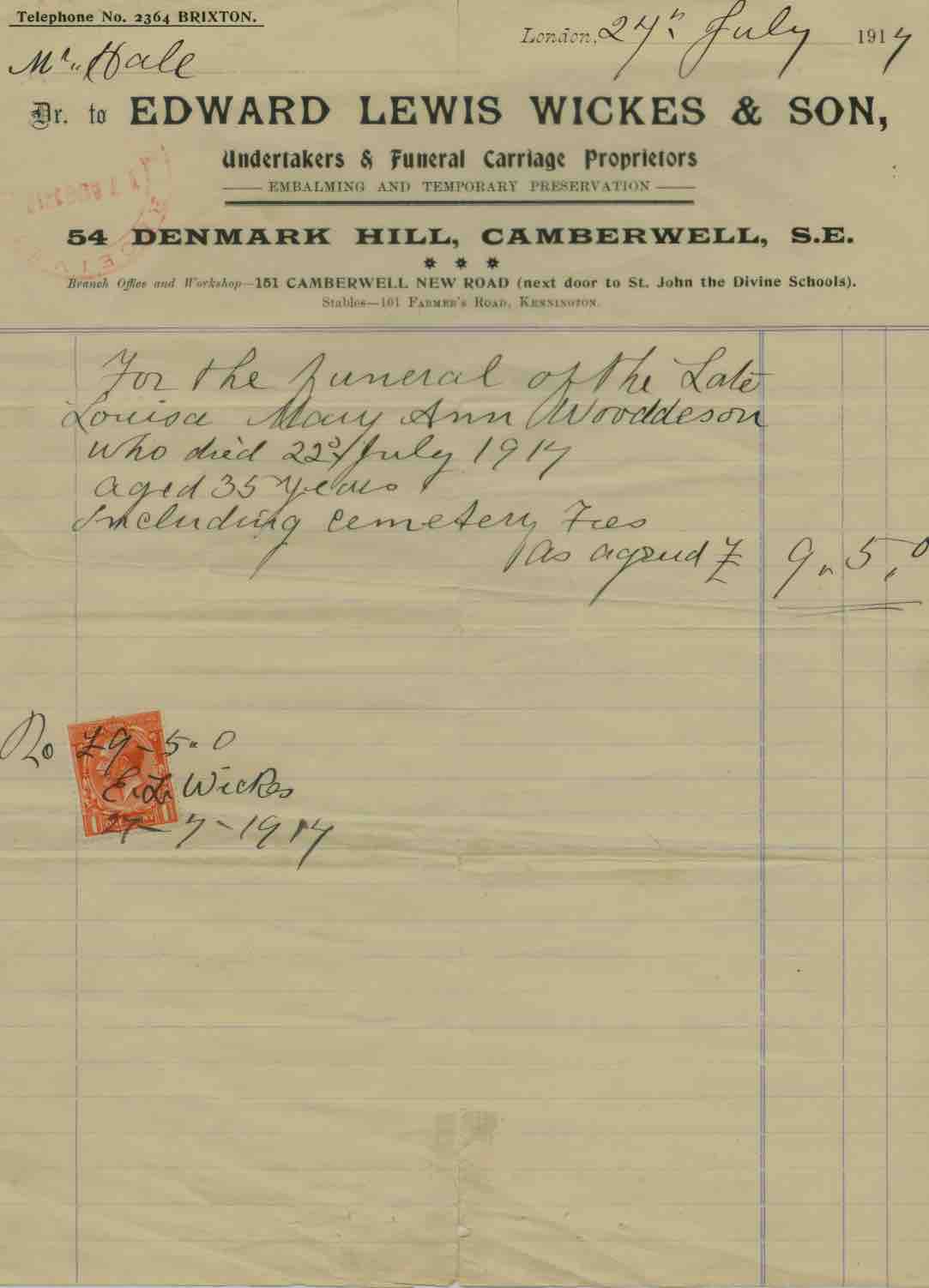
1917 - Helen (6)
Sunday today and Ernie, Bert and I all walked over to Brixton to visit Auntie Rose and Uncle Will as we usually do on a Sunday. Uncle Will gave us sixpence between us and the lodger gave us another sixpence so we were well paid for our half hour’s walk. Mum cooked a roast dinner while we were out and we were hungry enough for it when we got back.
In the afternoon all we kids went to Sunday school as usual at All Saint’s church just over the road. All the lads in our crowd got Bert (who is only 4) to wee through the grating down on to choirboys who were just coming out of the room where they get changed. He got some of them and they were really mad. They chased after us but we ran and they didn’t catch us.
When we got home the muffin man came round ringing his bell and Mum sent me over to buy a dozen muffins which we had with winkles for our tea.
1917 (23rd July) - Bella (33)
Beat’s husband Vin (brother to Ernest Hamshar) died of dysentery fighting in the Dardanelles on 23rd July - just the day after Lou died.
And it is only a few months since Lou lost her Bert on the Somme. That’s three of the family killed in this war in one year!!!
Bella would not have known of this death immediately - hence the date in brackets. Helen told me that he died of dysentery in the Dardanelles but the Service Record does not name the disease that caused this severe fever and the place of death is given as Mesopotamia. He is buried in Basra War Cemetery. The medical case sheet suggests that this was a very nasty way to die.
Conditions in Mesopotamia defy description. Extremes of temperature (120 degrees F was common); arid desert and regular flooding; flies, mosquitoes and other vermin: all led to appalling levels of sickness and death through disease. Under these incredible conditions, units fell short of officers and men, and all too often the reinforcements were half-trained and ill-equipped. Medical arrangements were quite shocking, with wounded men spending up to two weeks on boats before reaching any kind of hospital. These factors, plus of course the unexpectedly determined Turkish resistance, contributed to high casualty rates.
- 11012 killed in action
- 3985 died of wounds
- 12678 died of sickness
- 13492 missing and prisoners (9000 at Kut)
- 51836 wounded
- data from "Statistics of the Military Effort of the British Empire" (London: HMSO, 1920).
Vin seems to have spent the first few years of the war at home - working in the Grove Park Mechanical Transport Depot. This may have been because he was relatively old (31) on enlistment.
|
I wish to allot 4/- daily from my pay to my wife |
|
|
Corps |
Mechanical Transport Army Service Corps |
|
Regiment number |
M2/04821 |
|
Name |
Vincent Hamshar |
|
Address |
47 Canterbury Grove, West Norwood |
|
Age |
31 Years |
|
Trade |
Motor Driver - qualification Heavy Driver |
|
Attestation Date |
4th February 1915 |
|
Height |
5 feet 9 ¾ inches |
|
Chest Measurement |
37 ½ inches - expansion 2 inches |
|
Next of kin |
Mrs Beatrice Hamshar - wife 47 Canterbury Grove, West Norwood (altered to 53 Robson Road) |
|
Marriage |
Beatrice Woolford (spinster) - Register Office, Lambeth 15/3/06 |
|
Children |
Vincent Frederick - 19/8/06 - Norwood Harold Reginald - 4/10/08 - Norwood William Guilford - 11/6/14 - Norwood Albert John - 16/1/17 - Norwood |
|
Statement of the Services |
Joined at Grove Park 5/2/15 (Served Grove Park depot Victoria until 1917) Grove Park - Appointed (unpaid) A/Cpl 22/6/15 Grove Park - Appointed (unpaid) A/Sgt 29/1/16 Grove Park - Appointed A/Sgt Paid 23/11/16 |
|
Total Engagement |
Service reckons from 4/2/15 - Joined Grove Park 5/2/15 Embarked Hororate at Devenport 13/3/17 Disembarked Margil 22/5/17 22/5/17 - 12/7/17 - Reinforcements Camp - camp duties Admitted 40 BGH Basrah 12/7/17 Died Basrah 23/7/17 - Effects of heat |
|
Medical History |
Examined on 4 Feb 1915 London Weight - 153 lbs Physical development good Vaccination marks - 4 - left arm in infancy Vision RE 6/6 LE 6/6 |
|
Medical Case Sheet |
Disease - Effects of Heat with Hyperpyrexia 13/7/17 - Admitted complaining of headache with pains in back and legs temp 100 14/7/17 - Temp rose at 6pm to 105.4 - reduced by sponging to 101.6 15/7/17 - Temp varied between 101.8 and 103.8 til 10pm when it rose to 104.8 - reduced by sponging to 100.8 16/7/17 - Temp between 101 and 103.2 17/7/17 - Small whitlow opened left hand - soon afterwards patient became delirious and was caught with a razor saying he was going to cut his hand off = temp 104 18/7/17 - Still delirious - temp at 8pm 106.6 - reduced with ice pack to 103 19/7/17 - Condition same Temp between 103 -105 20/7/17 - Condition same - Temp rose to 107.4 at 12 noon - reduced by ice-pack at 6pm and 10pm Temp rose to 106 again reduced to 103 by ice pack 21/7/17 - Condition worse - During the day temp was 4 times over 106 - highest 109 - he was conscious for a short period 22/7/17 - Temp again rose to 107 and later to 107 reduced by ice pack 23/7/17 - Patient died at 12.10am unconscious Death due to active service and disease contracted by active service |
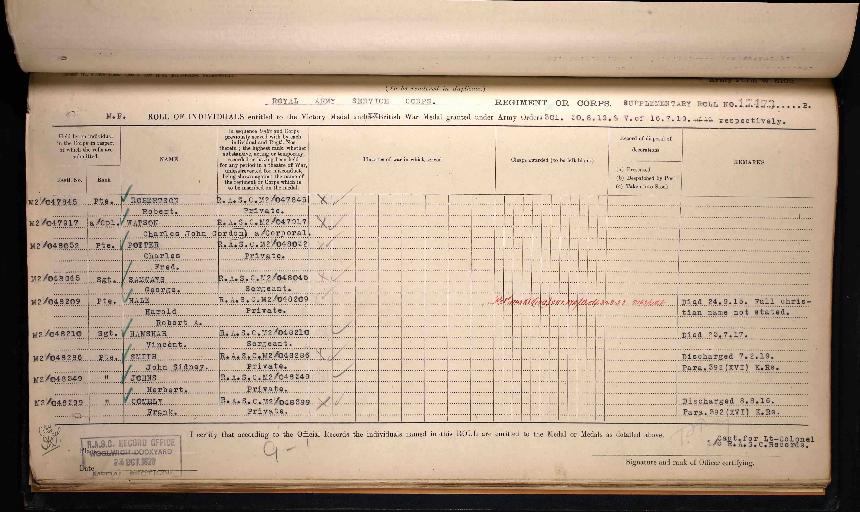
1917 - Bella (33)
Ernie has been home on leave for the past four days but we have had hardly any time to be alone together because his mother is round here all the time. I think she’s trying to make sure there aren’t any more grandchildren! She was just the same when Vin came home on his last leave, so Beat tells me. None of her daughters in law think much of her. She’s an interfering old cow and since she had to give up the laundry (she could not get enough workers with the war on) she has had nothing to do but to poke her nose into our lives.
Ernie says that the worst thing about being in France is the bombing raids. Fritz knows that Calais is a vital supply route and so there is bombing almost every night. He cut out this bit from the Express and saved it for me. He says this is just what it is like.
Ernest or Bella has written, “Keep this” at the bottom of the piece - bet they would not have expected it to be kept for over 100 years!
The original is difficult to read - this is the full text:
MOURNFUL MARY
When I hear a Londoner holding forth on the horrors of air raids and bewailing his hard fate and life of peril, I always tell him about “Mournful Mary,” the reigning godess of ---- (I nearly gave it away!) --- we’ll call it a French port.
Over a large area that town entirely lacks glass. Almost every house has its specially strengthened and sandbagged dug-out, and a small army of workmen are cutting in to its open spaces and pleasure grounds for the municipal shelters that are absolutely essential if he town is to be occupied at all.
Fritz can raid it comfortably between dinner and supper, and, if he chooses, can go back to fetch some more eggs and try again. A moon helps but isn’t necessary; any fine night will do.
I spent twenty-four hours there and that was enough. The night before I arrived it had been raided for five hours incessantly, and had received over 100 bombs. The casualties had been heavy and considerable progress made in the process of demolition. The hotel where I intended to stop had lost every single window, so I went to another which had still quite a reasonable number.
And now for Mounful Mary, the municipal syren. At noon precisely she delivered her wild music, and every eye sought the heavens. There, just out to sea, were nine planes in formation. They dropped a few quickly, and were then chased away by British machines. The rest of the day was quiet.
That might I had just finished dinner when, as everyone expected M. M. did it again and out went every light in the town. The man I was with took me to his abode, which he shared with a Belgian colonel and his family. We groped our way down two flights of stairs into a small and incredibly airless chamber, strongly sandbagged and strengthened with beams, where the colonel and family were already seated. I congratulated him on his handiwork, with which he was modestly gratified.
Every one had air raid boredom in its extreme but just as asphyxiation was becoming an actual nuisance the lights went on, everyone exclaimed “Ah!” in thankful tones, and I went back to my hotel. Distant firing was plainly audible.
I had just got to my room when M. M. surpassed herself once more, and I was in darkness. Presently I heard that ominous and penetrating hum and prepared for the worst. “Crash!” The windows rattled and the walls shook. Then six more not quite so near. Silence, and presently the lights went on.
I began to undress and then suddenly ten more appalling crashes, mingled with the smashing of glass, shook me to the core. This time M. M. had been badly outwitted, but she made up for lost tome by a series of `stertorous, if belated, bellows. Silence again, and the lights went on. Then crashes again, very loud humming, and then lights on again. By this time I was in the very worst temper of my lifetime. An hour passed and then another exact repetition of last time, M. M. and the bombs exactly coinciding.
In that town is a certain famous group of statuary recalling one great ordeal in its history. Just by the side of it the French had placed a Gotha, shot down near by, exhibited for the satisfaction of the much tried burghers. After the war they should erect a Gotha in marble in the same place, next to the emaciated individuals who “went through it” in thirteen hundred and something or other. For this martyrdom is worthy to rank with that. H R W
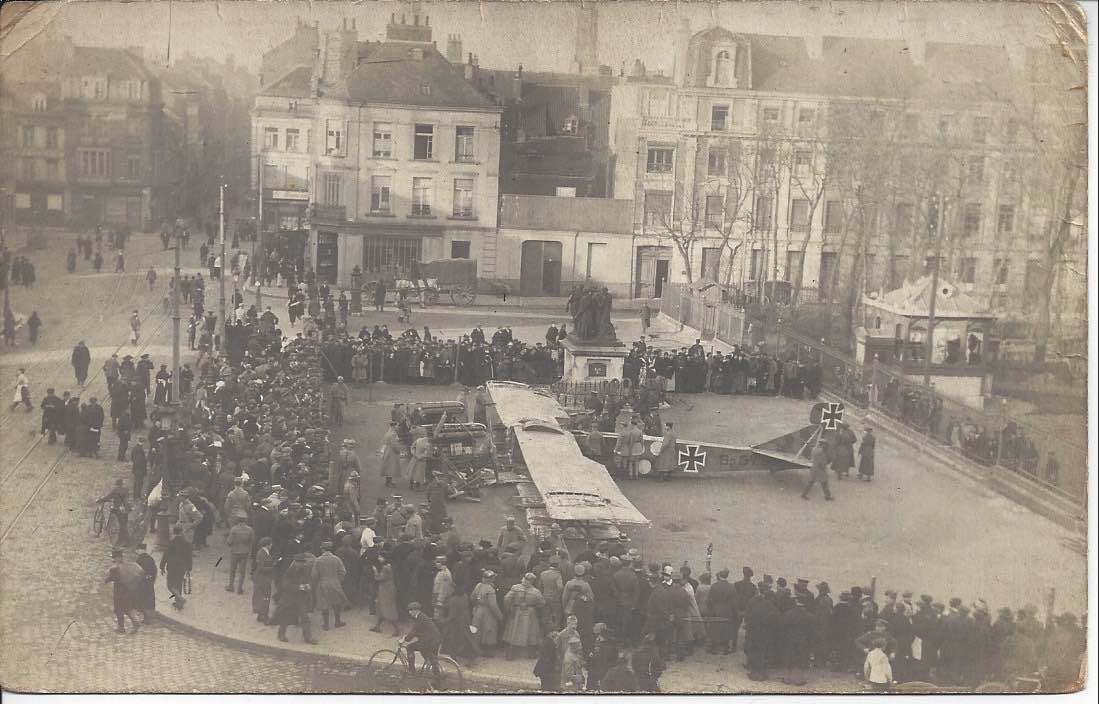

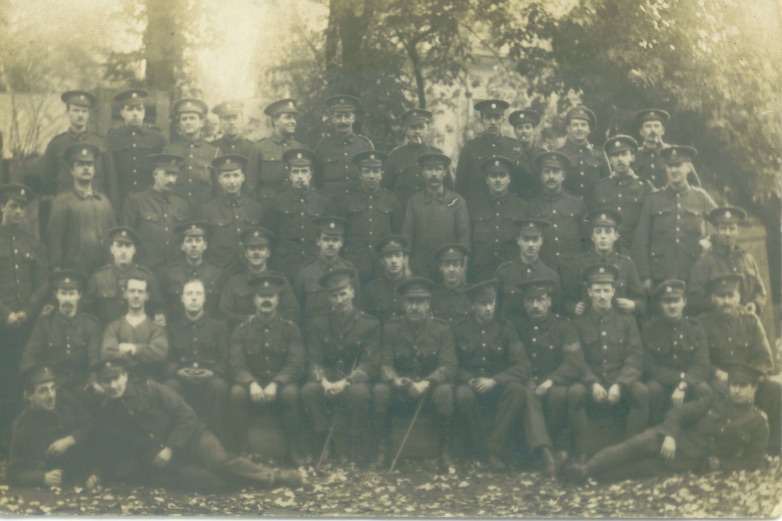
1917 - Bella (33)
I have taken a job as overseer to the cleaning staff in government offices in a house in Belgrave Square, which overlooks the River Thames. The house belongs to Lord Howard-de-Walden but it has been taken over as offices for the duration of the war. I go in twice a day - once very early in the morning and again in the early evening. A bus comes round to collect all the women at 5.30 in the morning. I have to leave the kids in bed asleep but Mrs Freeth, who lives upstairs, gets their breakfast for them and sees them off to school. I go out again after we have had our tea and Helen and the boys have to get themselves ready for bed, but I am usually home again in time to tuck them in.
Helen recalled going in to work with her mum for some evening sessions - travelling by tram over Vauxhall Bridge. When Bella finished work there, her colleagues had a brooch made out of Ernest’s Army Service Corps cap badge as a leaving present - Helen commonly wore this brooch.
The photo to the right shows Bella c 1917. A picture taken at the same time was in Ernest’s wallet when he was killed see 3rd April 1918.
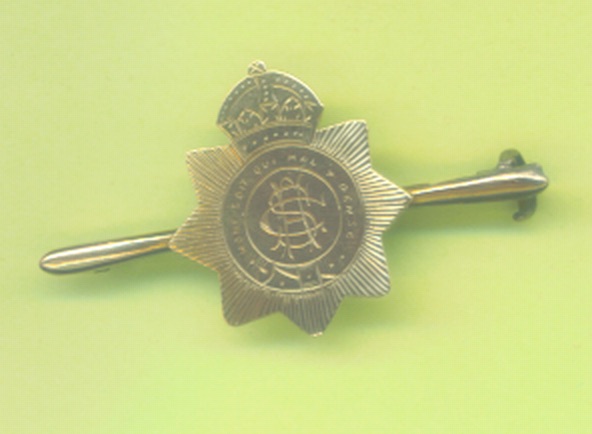
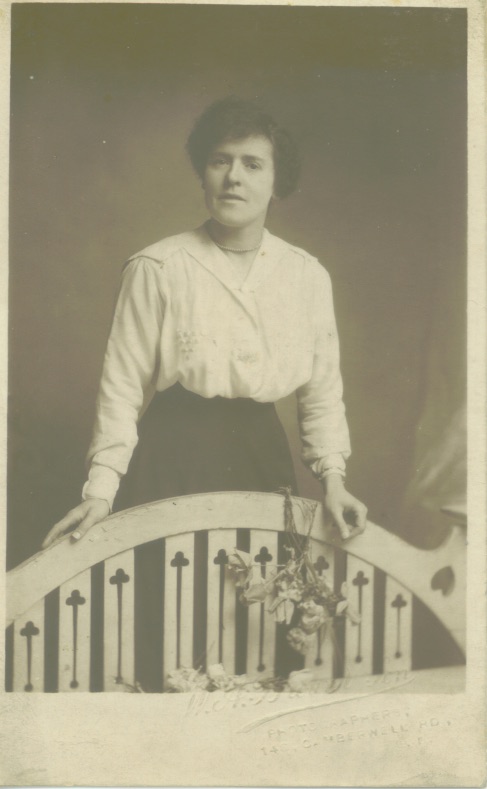
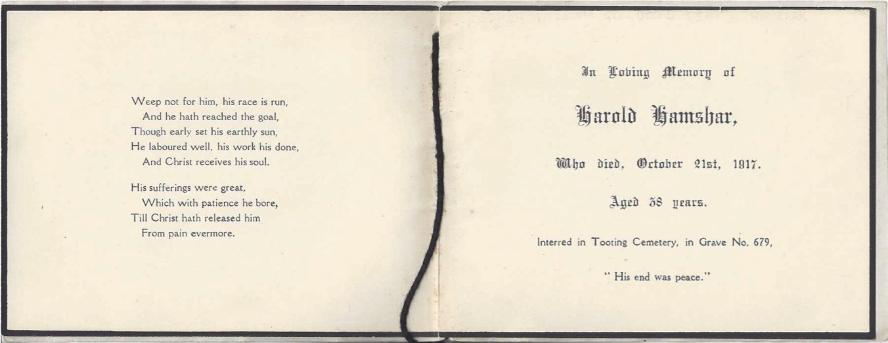
October 21st 1917 - Bella (33)
Yet another death - this time Ernest’s brother Harold who has died, aged 38, in Cane Hill hospital where he had been for some time.
Cane Hill was a psychiatric hospital. It is not known precisely what Harold was suffering from but it may have been tertiary syphilis. Helen visited him on one occasion and said there seemed nothing physically wrong with him. Harold was never married - in the 1911 census he was living with his parents William & Emma at 7, High Street West Norwood - and there is a family rumour that he was gay. He had served in the military as a Hussar but I can find no record of this.
3rd April 1918 - Helen (7)
Today I wrote a letter to my Dad. I sent him some pictures as well that Mum had taken of us all last month. I do hope he writes back to me soon. This is what I wrote in my letter.
88 Grosvenor Terrace Camberwell
My Dearest Dad,
I am writing just this little letter hoping to find you quite well and safe. Its a long time since I have seen you but there I must not grumble for you might be all home soon. Dear Dad we are all quite well and getting big. I hope you will know me the next time you come home. I am going up in to the big girls next week and Ernie is going into the third standard. I think this is all now with lots of love and kisses from your loving little daughter
Nellie xxxxxxxxxxxx
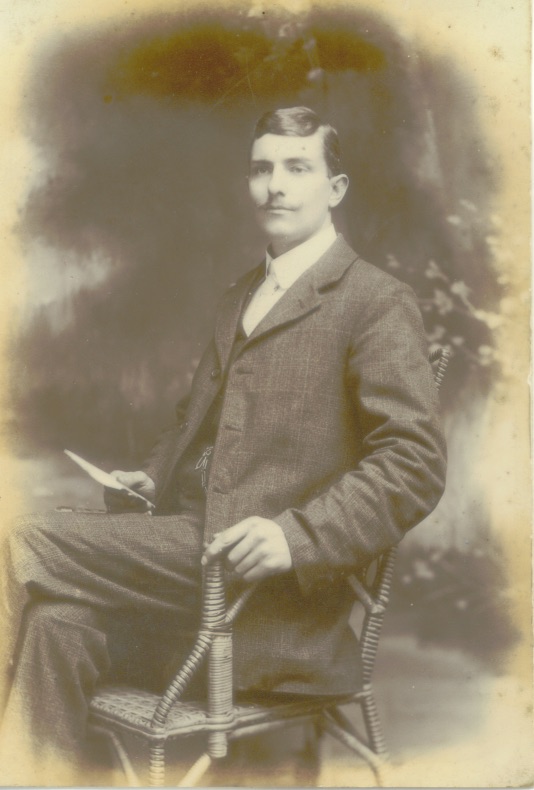
April 10th 1918 - Ernest (32)
I received a letter from Bella with a little letter from Nellie in it. She’s seven now and growing up so fast to write a letter like that. I have written back to her today. Bella also sent a photograph of herself and another of Nellie and Ernie. I have seen so little of the children in the past three years that I don’t feel as if I know them.
10-4-18
My Dear Nellie
I received your letter quite safely and I am very pleased with it. I am quite alright and I hope you are too, it is a long time since you saw me but I hope to be home again soon to take you all out. If you keep getting big I shall not know you so you will have to stop growing until I come home. Dear Nellie I am very pleased to hear you are getting on so nice at school and that you are going into the big girls, also Ernie. I think he is getting on fine going into the third standard. I must close now as I have not much time, so I hope you children keep well and are all good and do as your Mother tells you because you know you must cheer her up while I am away and not give her any more trouble than you can help.
With love from your loving
Dad xxxxxxxxxx
The original is shown to the right. For the original of Helen's letter see below.
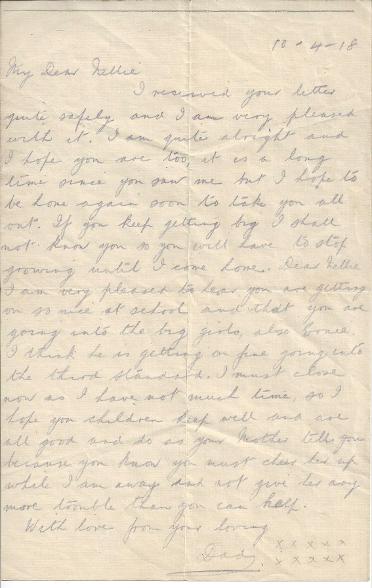
14th August 1918 - Helen (7)
Today is the last day of my holiday in Whitchurch where I have been for two weeks with Lilly and Auntie Annie. She is not really my auntie but a friend of Mum’s called Mrs Sitwell who lives at the other end of our street, Grosvenor Terrace. We are staying in lodgings where we all sleep in one bed and the landlady makes us breakfast and supper each day. For breakfast we have eggs and bacon and delicious fried bread. Usually we have a cold meal at suppertime but on Sunday we had a roast and Auntie Annie found a caterpillar in her cauliflower.
The weather has been warm and sunny and during the day we spend a lot of time playing round the farm. It is harvest time and we watch them cut the corn and pick out all the beautiful poppies and cornflowers after they have been cut down. Today we saw the men clubbing the rabbits that rushed out of the last bit of corn to be cut. hey will eat them but we shan’t get any because we’re going home tomorrow.
I fell in a bed of nettles and it still really hurts even though Lilly and Bert (who lives at the farm) rubbed dock leaves all over the stings. But I did cheer up when I got back and found a beautiful white silk dress that Auntie Annie’s sister has made for me. I shall wear it to go home in.
15th August 1918 - Helen (7)
Came back from holiday today on the train to Waterloo station. Mum and Uncle George, who drives a cab, should have met us at the station but they missed us in all the crowds of soldiers and so we got a different cab home. Auntie Annie took us back to her house and Mum and Uncle George turned up about half an hour later.
Mum came in to the kitchen and said, “What would you do if I said you won’t see your Dad again?”
I knew straight away what she meant and we all cried. He was serving in the Mechanical Transport Corps in Calais and had been killed outright by a night-time bombing raid on 12th August.
The photos and letter below were all in a wallet in the breast pocket of Ernest Hamshar when he was killed by a bomb on 12th August 1918 and are scarred with a shrapnel hole through them. Bella has written on the backs "To Our Dear Dad from your litle Son & Daughter Ernie and Nellie" and "To my Dear Husband from Your Loving Wife Bella".
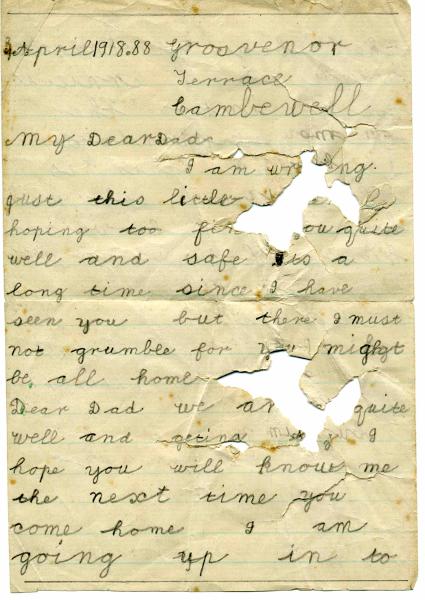

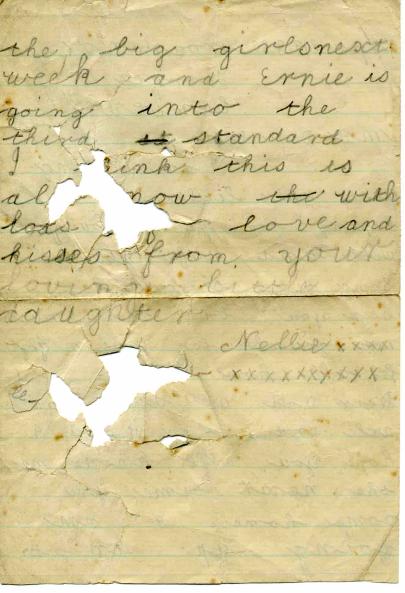
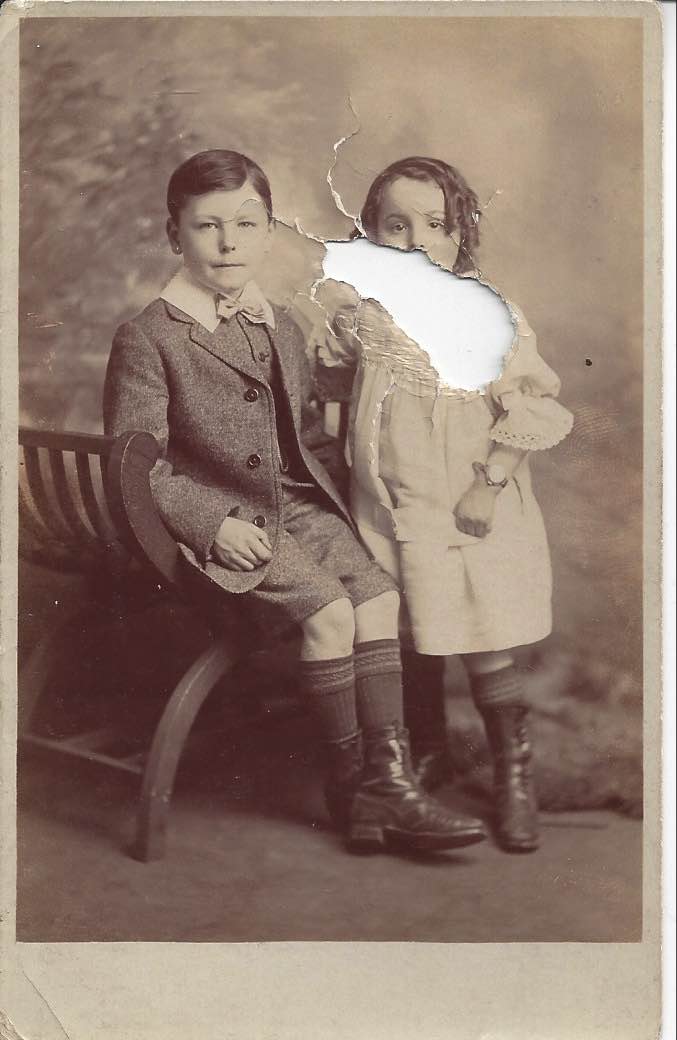
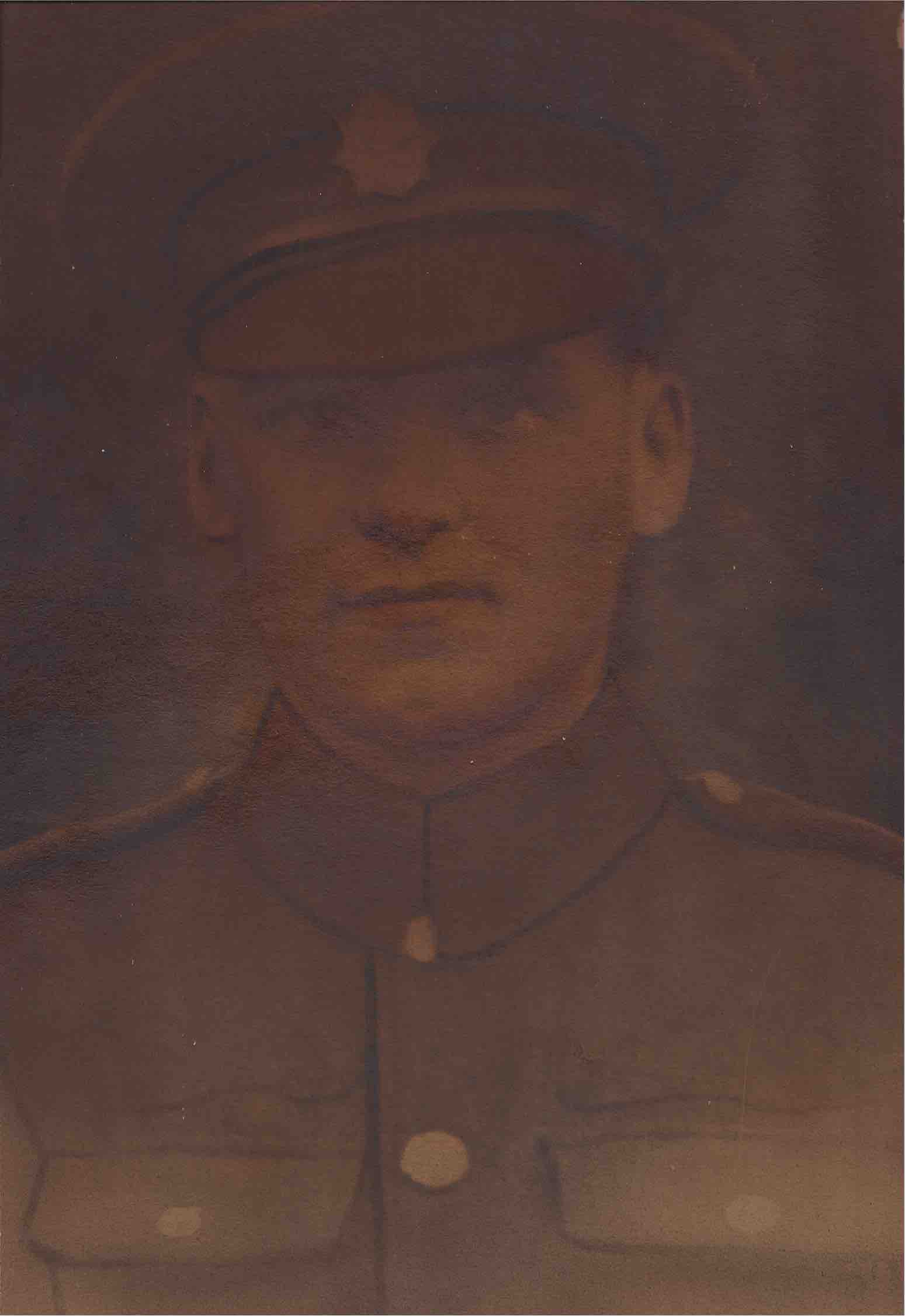
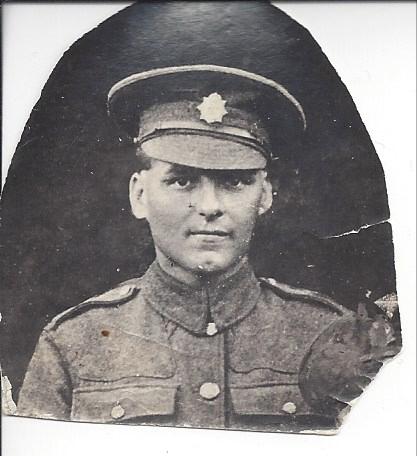
After the official notification of Ernie’s death, I received a short letter of condolence from Ernie’s depot soon after he was killed and I have now received a really nice long letter from Ernie’s commanding officer Sergeant Staveley. He told me all about the raid in which Ernie was killed and about his funeral, which was with full military honours. He made it sound as though he was a real friend as well as a C.O. I should like to meet him and I have written back inviting him to visit us when he is next on leave in London.
The letter from Sergeant Staveley is badly faded so I have not included the original - the full text is reproduced below.
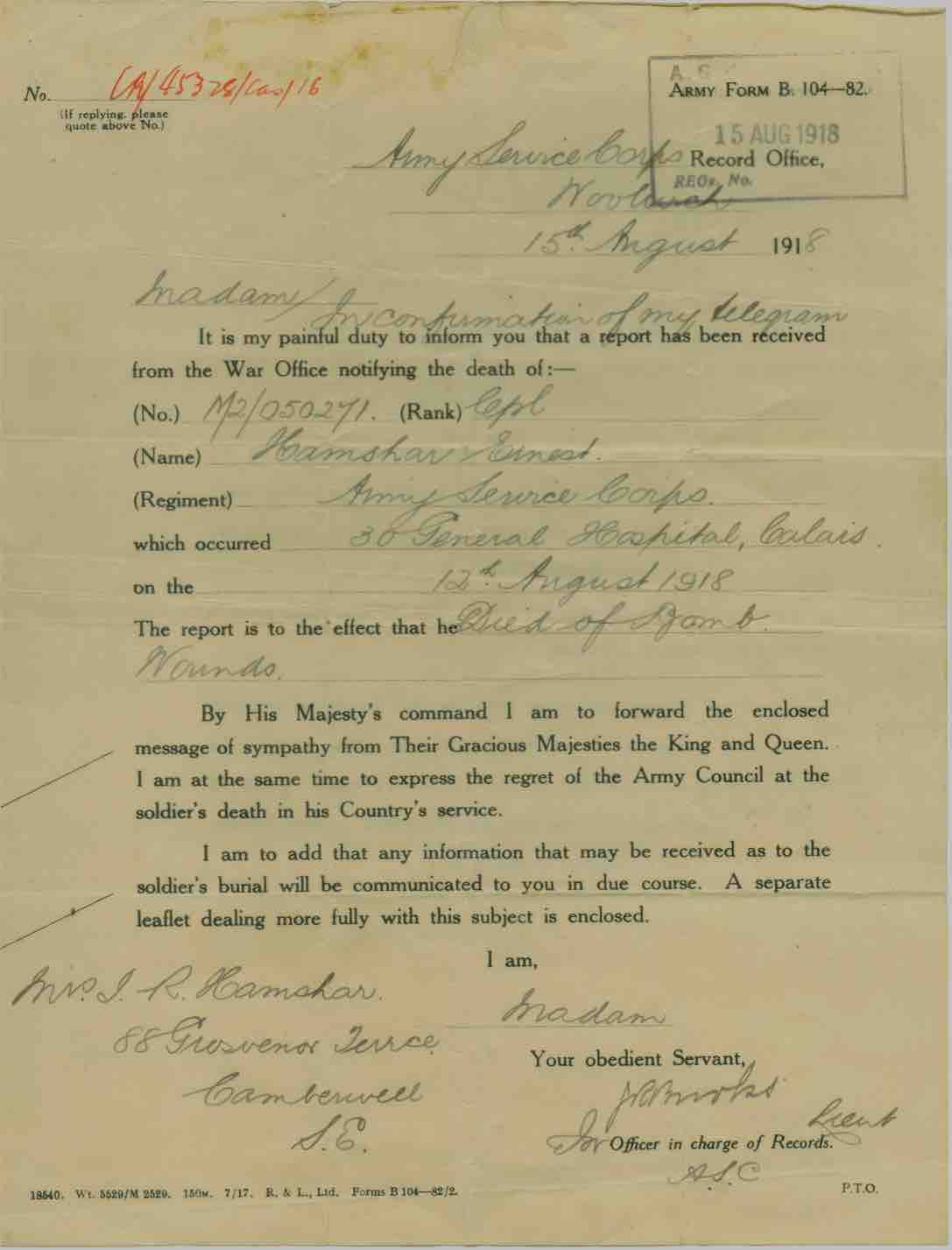
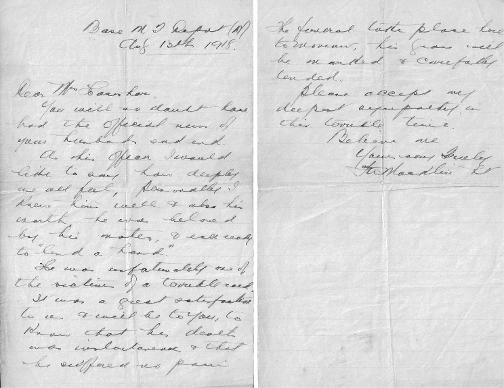
Saturday August 24th 1918
Dear Mrs Hamshar,
Now that we are just about over the terrible experience of the recent raid, I am writing to you, to express my very deepest sympathy on the loss of your dear husband Ernie. Perhaps I had better explain first of all that I am Sgt Staveley with whom Ernest has worked all the time we have been out here. I don’t remember Ernest at Grove Park but I made his acquaintance on board “The Viper” which brought us over to Rouen in 1915 (May). Strange to relate perhaps, but as soon as we were fixed up in our new surroundings there, I found myself sleeping next to Ernest, & after we came here, we slept in the same tent for a considerable time, & always pals. I am a very sensitive sort of fellow myself Mrs Hamshar & after this affair had taken place, I thought to myself how many would be writing to you all at once, & sort of overwhelming you with the terrible news. Therefore I considered best to let a few days pass & then relate to you that which I feel sure you would like to know.
It was a clear night, starry & no moon & about 10.30 pm. The usual “warning” came through that enemy aircraft was about. We all turned out to take cover in the dugouts provided, & many were just on the point of clearing out, when the crashes came & so unexpectedly. The plane which came over our place had evidently swooped down & engine shut off, causing little or no noise as it passed over. The bombs fell right inside the huts. Ernest was one of the men just about to leave I understand, & his end must have been instantaneous. The rescue party quickly got to work amongst the debris to bring out anyone they could find in the darkness, for no lights could be used then as the bombing was still going on very near. Dear Mrs Hamshar, my heartfelt sympathy goes out to you & your children, for I know he was a good husband & father, because I always found him a true pal & a man at all times.
I shall miss Ernest more than most people are perhaps aware, for our friendship and understanding of each other was very high after being together for over three years, & I doubt I shall get another to replace him as a clever hand. Give him some tools & he would turn out anything that might have been asked for.
The funeral was one of full Military Honours & I with several others of the company went, & the burial took place actually at 1 o-clock in the afternoon of Thursday the 15th inst. We arrived at the Hospital where all the victims had been taken. The troops were all lined up on the road in front & The firing party lined up each side of the Gateway to the Hospital. I was detailed one of the bearers to help carry out the coffins, which were carried on the shoulders of six bearers, & draped with “The Flag”. We carried out sixteen, (all victims of the same night, but from different units) & placed them on the wagons which were “pair horse” turnouts. The “scene” was very impressive & one which I shall never forget. As we carried out each one The Firing Party came to “The Present Arms” & everyone else on Parade saluted at the same time. Enough wreaths had been sent from the different units to cover all the wagons. Five in all went from our company, one from the Commanding Officer, The Sergeants, The Corporals & Men, & The WAACS. The Cortege started off with The Firing Party with “Reversed Arms” in front. At their rear, three Field Chaplains, then The Wagons & all bearers at the side, whilst the remainder of the officers and troops followed the wagons. Dear Mrs Hamshar, your dear husband was well liked and respected by everyone in the company who knew him. On arrival at the Burial Ground, the service was conducted by the Three Field Chaplains. The coffins, sixteen in all, were in one grave & all the Officers and other ranks stood around. The firing party fired three rounds & the service terminated by the Bugler sounding “The Last Post”. Although I stood there all through the ceremony, my thoughts were of you & the relatives of all the others who were being laid to their last rest, & sharing your sadness. I trust God will help you to bear this most terrible blow & loss, & help you & the children to pull through. This is one of the sad reverses in life which time only can heal, But allow me to ask you Dear Mrs Hamshar to think that Ernest died doing his duty as a solider & a man for his country’s cause.
There is one other item I have omitted to mention. The Burial Ground is one opened by “The Military” just outside Calais & the place is named “Les- Barracques”. The Ground itself lies just over the sand dunes on the coast and anyone could throw a stone into the sea at twice from the spot.
I will close now again expressing my most deepest sympathy with you and your dear children in your sad time.
Yours very Sincerely Sgt A. Staveley M2/082929
PS If there is anything you would like to ask let me know.
October 1918 - Bella (32)
I have had another letter from Sergeant Staveley today, with a postcard showing where Ernie is buried (marked with a cross) and a photograph of the grave. The name of the place is Les Baraques Military Cemetery in Sangatte, which is a village to the West of Calais. The Cemetery is quite close to the Bleriot monument which is shown in the foreground of the postcard Sergeant Staveley said that it is possible to see the cliffs of Dover from the sand dunes behind the cemetery.
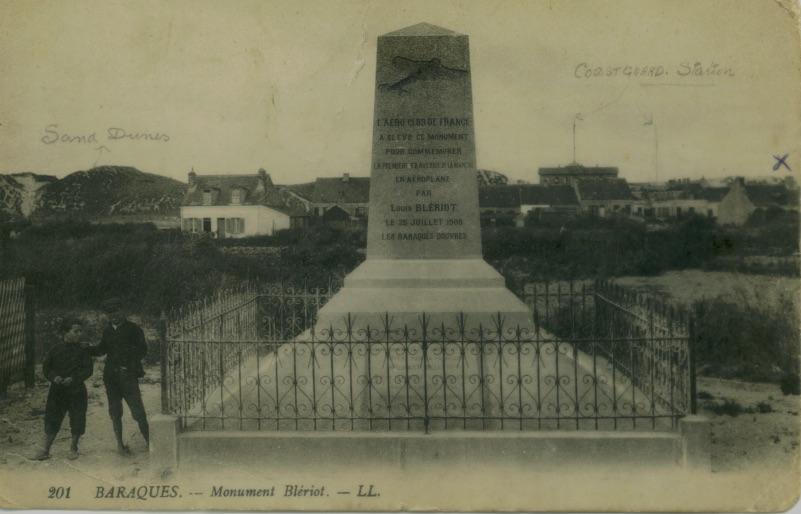
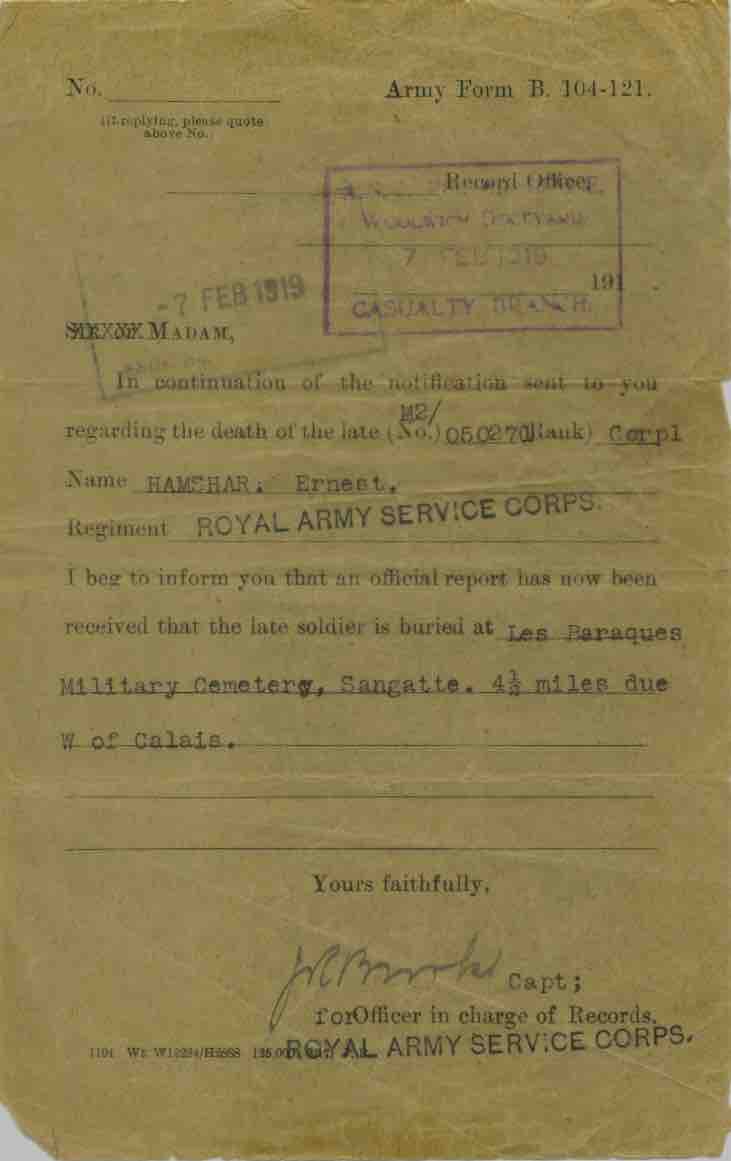
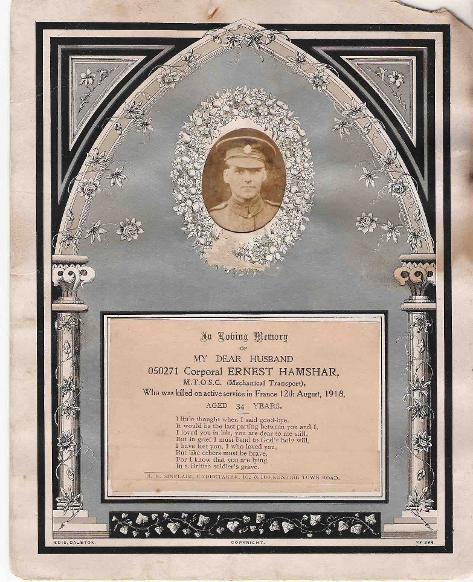
November 1918 - Helen (7)
This afternoon, Bert’s Auntie Rose took me on the bus up to London to see all the Armistice celebrations. People were riding about on the tops of the cabs waving flags and singing and shouting. Mum was cross when she found her sister (my Auntie Nell) dancing outside the pub. The Armistice came too late for my Dad.
March 1919 - Bella (33)
Today I received a letter from the War Office saying that I have another £11/18 coming from the Army for Nellie and Ernie. Last month I got £5/19/1, but I had to send off a form before they would let me have the money due to the children. These payments were the settlement of Ernie's accounts - in other words his last wages.
The Ministry of Pensions wrote to say that my total pension from the Army is 26 shillings and 8 pence a week. I don’t see how I could manage on that if I hadn’t got the money from letting out the top two floors at 88 Grosvenor Terrace.
Nellie has been having some terrible nosebleeds in the night. I’ve tried putting keys down her back but it doesn’t seem to stop it - it just wakes her up and makes her cry. I took her to the doctor and he said that she might be fretting about her Dad. I could do without Nellie being ill as I have enough trouble with the boys. Ernie has a weak heart and Bert has a curvature of the spine so that he has to wear leg irons to help him walk straight.
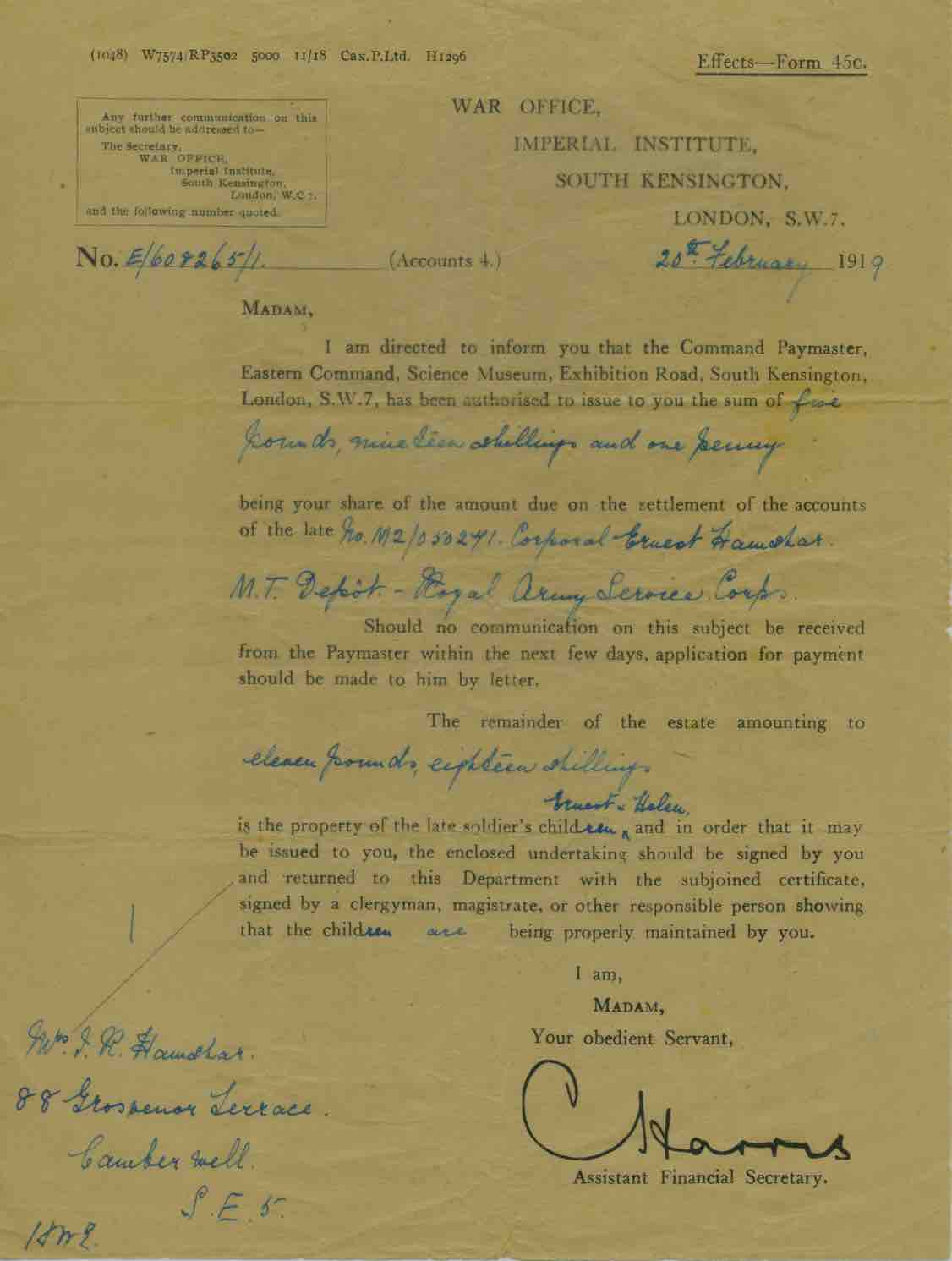
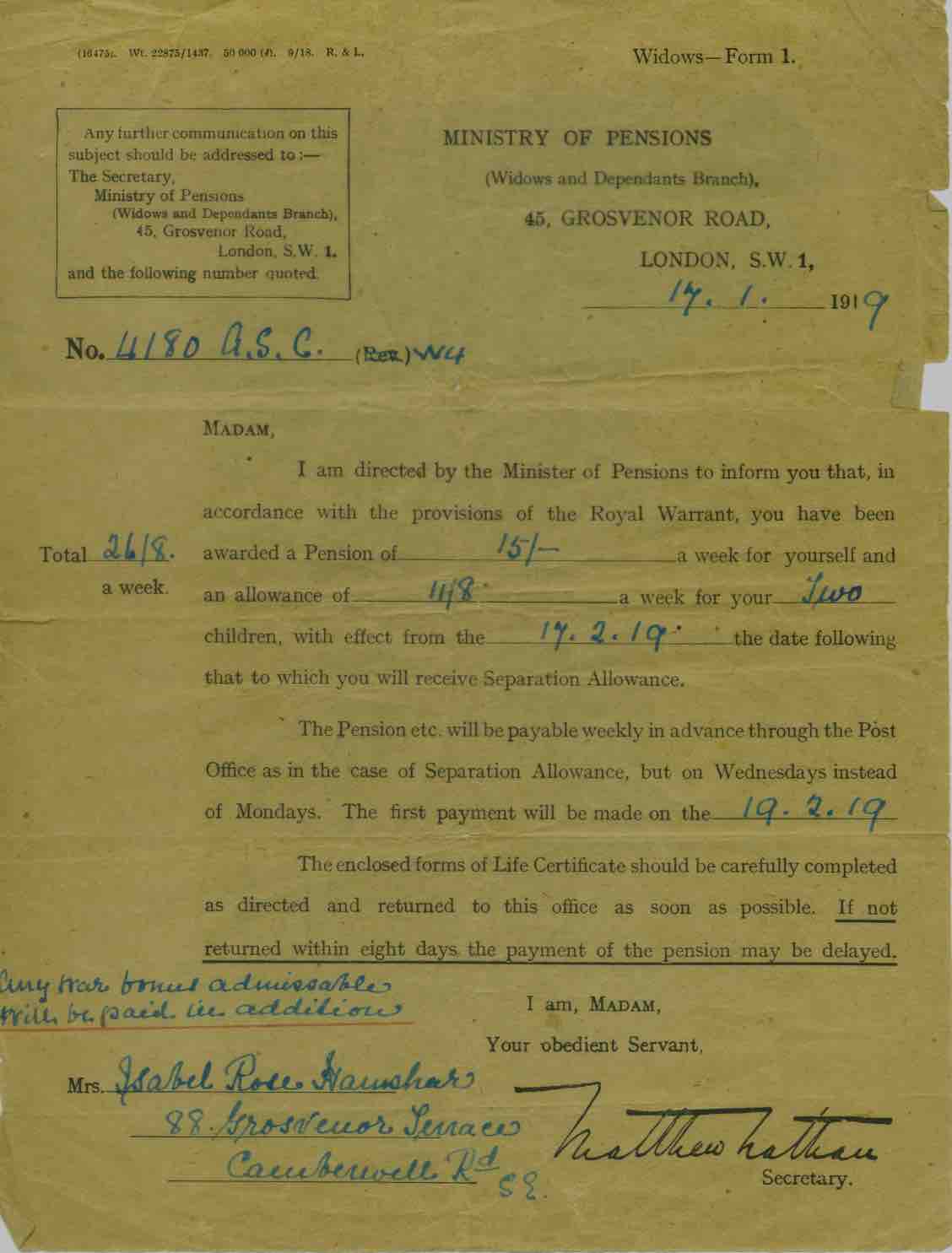
1919 - Helen (8)
I was playing with my friend Doris in her garden when Mr. Greenfield, who is a lodger in their house, came out and asked if Doris and I would like to go to London with him because he had to go to get some theatre tickets. We said, yes please! So he took us on the bus to the Lyceum Theatre in the Strand where he bought tickets for ‘The Savage and the Woman’. On the way back to the bus we passed someone selling knickknacks in the street. Mr. Greenfield bought Doris and I a magic flower. It was a cockleshell and when you put it in water it opened and a flower floated out of it. It is ever so pretty.
Today is Monday and it is wet. I hate wet washing day. When we get back from school Mum is always bad tempered and tired and the house is all full of steamy wet washing and the smell of Hodson’s Soap Powder.
But I did feel a bit better when Mum sent me out shopping. It was good to get out of the house. First I went round to Higgs Dairy, where my Dad used to work, to get some skimmed milk to make a pudding. On the way home I went for the bread. There was an extra slice to make up the weight and it was all fresh and warm and ... delicious. It never got home!
After tea, at 6 o-clock Madam Tozer came round to give Ernie and I our piano lesson. Ernie had his lesson first (he is a lot better than me) and then it was my turn. We both have half an hour and Mum pays 6 pence a week for each of us. We learn from a book called Ezra Reed. Madam Tozer is quite strict with us. She is a bit strange. She wears all black and she has lots of bangles and rings and always a string of jet beads. Bert used to have lessons too but he never seemed to get on with learning to play the piano so Mum bought him a violin. But he isn’t much good at that either. I hate having piano lessons in the summer when it is nice and light outside and all the other children are out playing but on a wet, dark evening it doesn’t seem too bad!
30th November 1919 - Helen (8)
My Grandpa Hamshar died today. He was 75 years old. Mum and Auntie Beat and I went up on the bus to the cenotaph to lay a wreath for Dad and Uncle Vin. On the way back we called in at the hospital to visit Grandpa but we were too late. He had died just before we got there. I liked my Grandpa. He was good at music and I remember him showing me how to hold my hands when I play the piano. He showed me his medal too that he won when he was a soldier in Canada. It had writing round the edge which said:
690 PTE W. HAMSHAR. 4:BT:RIF:BDE:
He often wore a top hat and he always looked nice. Grandpa used to live with Auntie Lettie and Uncle Evan at 16 Pyremont Grove, West Norwood.
When in Canada (1865-1867) WGH was stationed in Montreal. He received a Canadian General Service medal at this time – the bar reads ‘FENIAN RAID 1866’. The medal was almost certainly received for WGH’s participation in the repulsion of the Pigeon Hill invasion by the Fenians on Saturday June 9th 1866. This was a non-event really as although the British forces marched to Pigeon Hill and prepared to defend against the Fenians they never showed up apart from odds and sods of whom 6 were killed and 16 captured.

January 1921 Bella (36)
I have been in correspondence with the Infantry Records Office about Bert Wooddeson’s medals. The first letter I got from them was a standard typed letter asking details of his relatives:
May 1920
To Mrs, Hamshar, 88, Grosvenor Terrace, Camberwell
In order that I may be aided to dispose of the plaque and scroll in commemoration of the soldier named overleaf in accordance with the wishes of His Majesty the King, I have to request that the requisite information regarding the soldier’s relatives now living may be furnished on the form overleaf in strict accordance with the instructions printed thereon. The declaration thereon should be signed in your own handwriting and the form returned to me when certified by a Minister or Magistrate.
Signed on behalf of The Officer in Charge of records.
When I wrote saying that his wife had died they replied asking for details of his will:
Madam
With reference to the disposal of Medals awarded to the late soldier above named I am directed to inform you that under War Office instructions same were the property of his wife now deceased and under the circumstances can you kindly inform me if any Will was left by her if so will you forward a copy duly confirmed by a Magistrate or Minister. Prepaid Cover enclosed for a reply.
I replied that there was no will and as I am the Guardian of his son I should hold them in trust for him. This they readily agreed to:
18-1-21
Madam,
I have to acknowledge receipt of your letter of 15th inst relating to Medals awarded to the late soldier above named and I am directed to inform you that the British War Victory Medals awarded are not yet available for issue same will be forwarded to you to be held in trust for the late soldier’s son on receipt from the war Office Kindly notify this office any change of address.
Yours faithfully CW
All the correspondence (including Bella's letter) is included in Herbert Wooddeson's Service Record which I obtained online. The letters to Bella are difficult to read as they are handwritten and there is other material on the back that has bled into the image – I have thus typed the text above. The medals presumably went to young Bert as I do not have them. It is interesting that the letter from Bella is typed. I do not know where or how she had access to a typewriter.
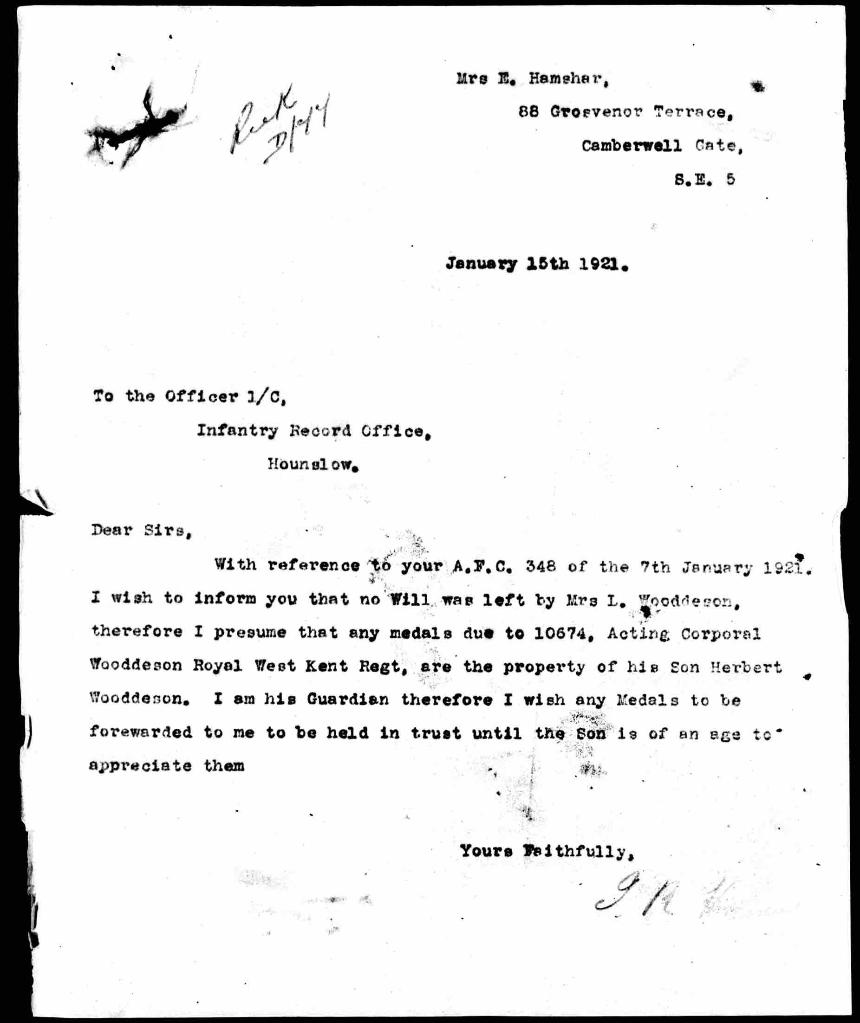
April 1921 - Helen (10)
I brought my school report home. I came 36 out of 48 in the class but as I am the youngest in the class (but one - and she is the daughter of a teacher, Mrs Whittaker) Mum was quite pleased.
I have been on an outing with my class at school to visit the Houses of Parliament. The day did not start too well. It is quite a long walk to school from Flemming Road (where we now live with Uncle Bob) and on my way I was watching a group of boys playing football when I bumped into a road works sign that was in the middle of the road. My nose started bleeding really badly and I couldn’t stop it until I got to school. They cleaned me up before we all set off to catch the tram up to London. The Houses of Parliament was very interesting. There is a huge doorway to go in and they have green seats in the House of Commons and red seats in the House of Lords.
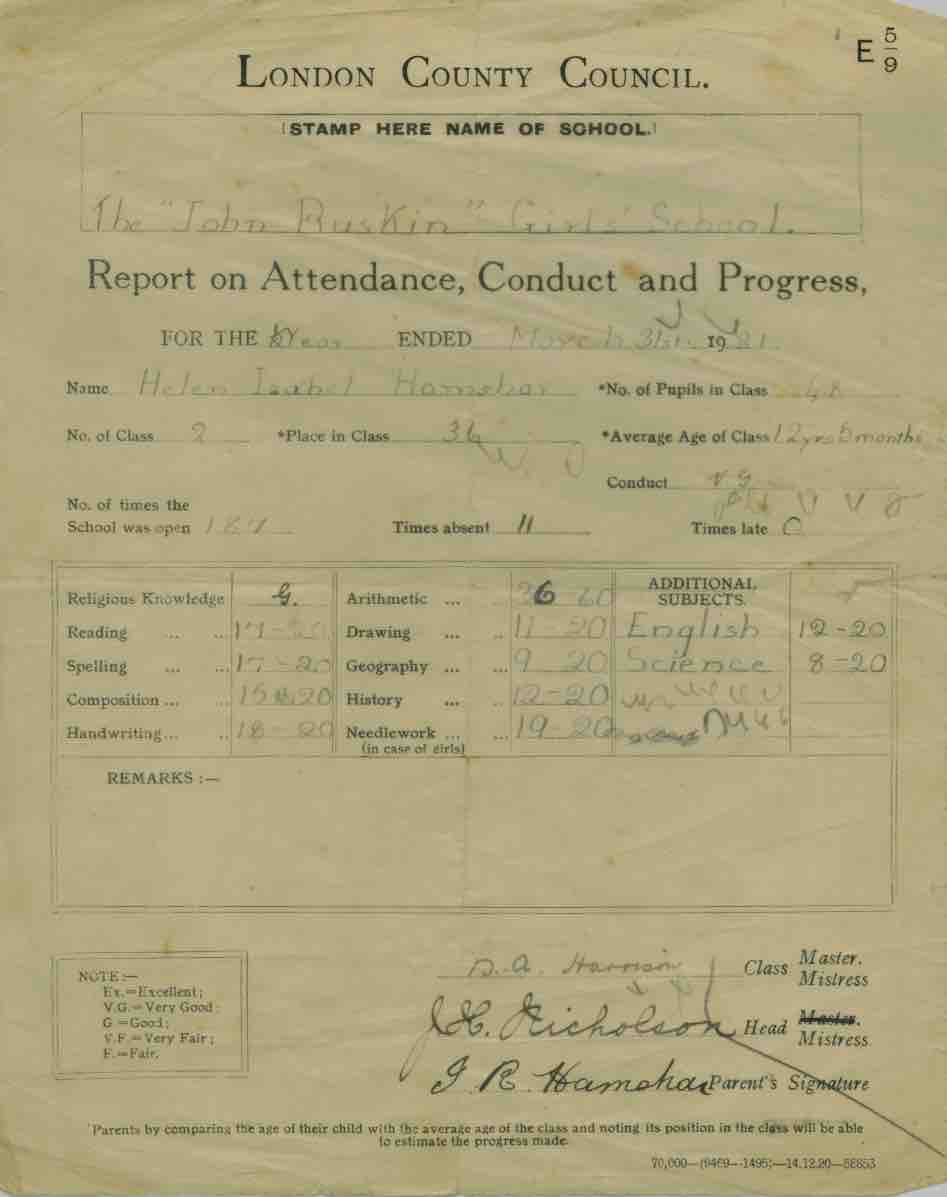
25th November 1921 - Bella (36)
My brother Fred has died of a strange disease called sleepy sickness.
This strange plague affected over 5 million people worldwide in the early 1920s. It was never fully identified and disappeared as suddenly as it had started.
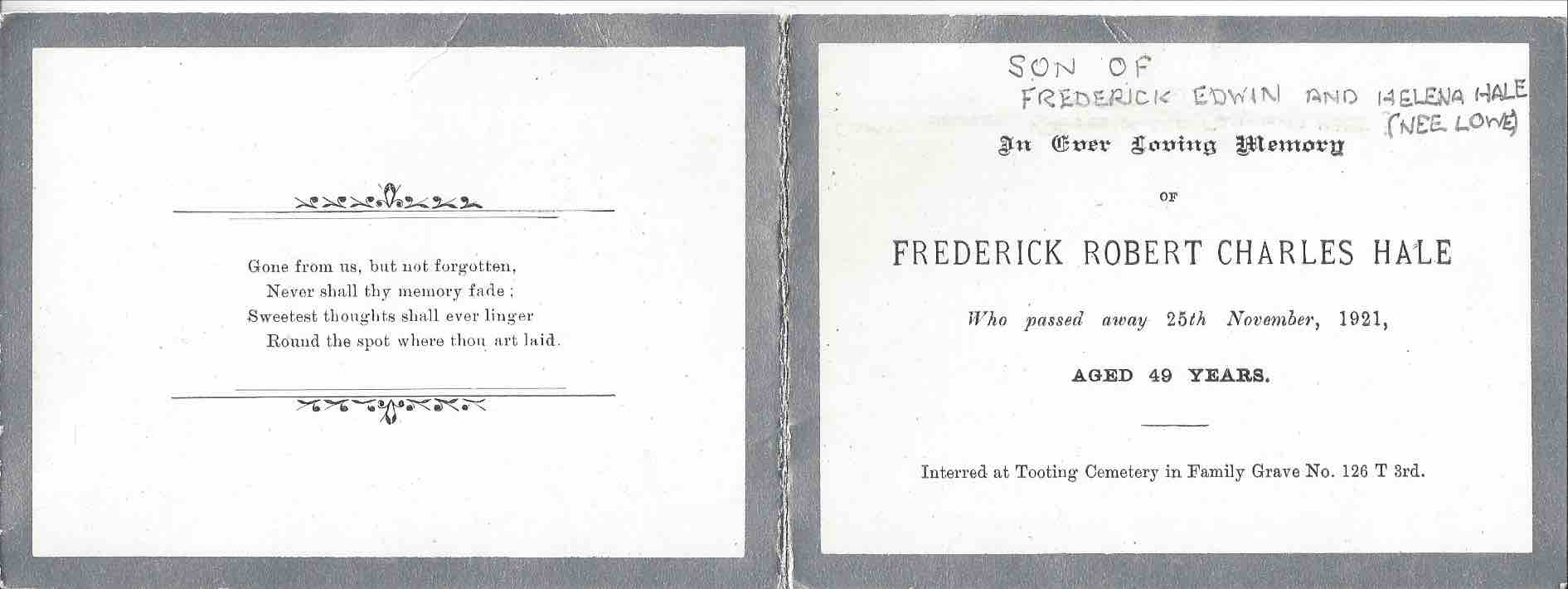
Saturday 24th June 1922 - Helen (11)
Today I sang with the John Ruskin School Choir in the Great Choral festival at the Crystal Palace. Only those children who had passed the examination were allowed to go but I was all right as I passed mine in May. We have been rehearsing for months and we have all got our own copies of the book with all the music in but today we couldn't use it - we had to sing it all from memory.
It was lovely! There were 5000 children there from all over South London. All the girls had to wear white dresses and the boys wore white shirts and we sat in tiered rows on wooden benches. One of the songs was called The Butterfly and we all had made butterflies out of crepe paper to wave as we sang it. In another part we all had to wave a white handkerchief.
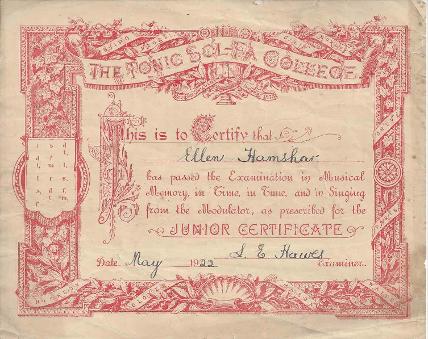
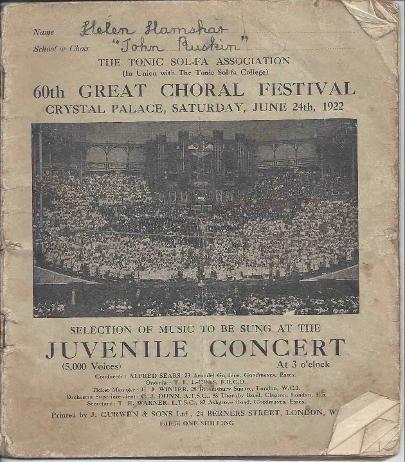
1922 - Bella (38)
Today I’ve seen the house that we are all going to move to. My friend Belle Keeble and I saw an advert for some houses being built at Grafham near St Neots and we went up on the train to have a look at them. But when we went into the estate agent he said, ‘Why don’t you have a look at some in Eynesbury first?’
They are brand new council houses and they are really nice with a bathroom with a geyser and a swivel basin over the bath and a separate lavatory. There are three bedrooms upstairs and a big dining room, a small sitting room and a scullery downstairs, as well as a coal store and a big pantry. All the rooms have fires and there is gas light upstairs and down.They cost 13 shillings a week, which I can just about manage out of my pension. We shall be having 32, Ferrars Avenue and Belle, her father (Belle’s mum died last year) and her little girl Rosie will get one just across the road. Behind their house there is a field with cows so we shall really feel to be out in the countryside.
We have wanted to move out of London because I am fed up with living in Flemming Road with Uncle Bob and fighting him off all the time. We moved in with him six months ago after his wife, my Auntie Nell, died so that I could be a housekeeper to him, but he can’t keep his hands to himself and I’ve had enough of it. Also the doctor says it will be much better for Ernie’s weak heart if we go to live in the country,
This move made a dramatic change in the lives of the Hamshar family but their rural idyll only lasted for 3 years as they moved back to London in November 1925
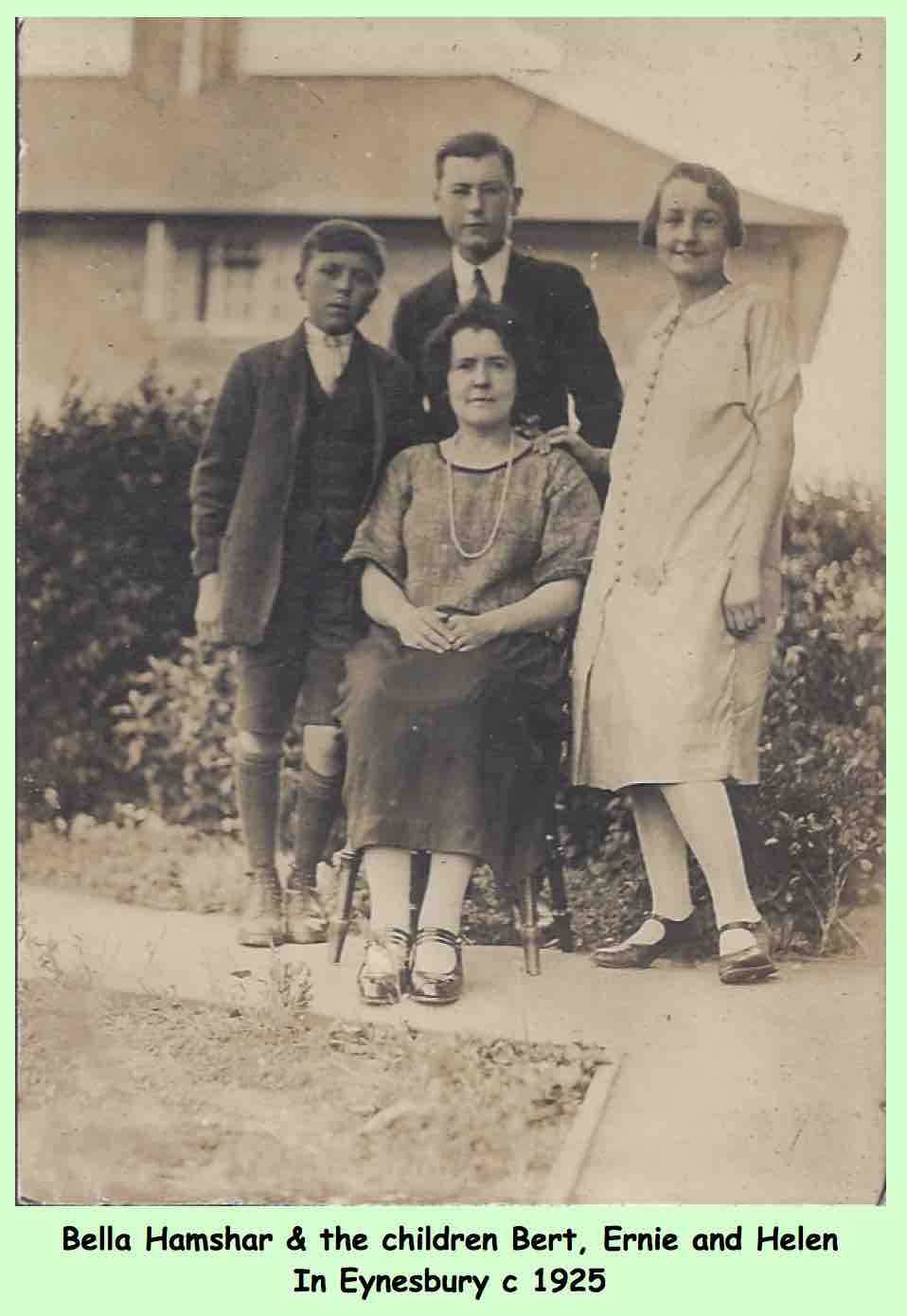
1924 - Helen (12)
I really like life here in Eynesbury. The school is much smaller than John Ruskin School with one big hall divided with two curtains into standards one, two and three. The infants are in a separate little room. I am in standard three and our teacher Mr James is really nice.
I have made lots of friends since we came to live here and when we are not in school there are lots of interesting places to play especially in the summer time. I go to Sunday school each week and help Nellie Flint with the younger children. Miss Somers takes a needlework class one night a week and I go there with all the other village girls of my age. I am keeping a record of what I have made in my notebook.
|
No of Garments made in the year 1924 by N Hamshar |
||
|
Garment |
Started |
Fini |
|
Vest |
X - 1923 |
|
|
Teapot Cosy |
7-1-24 |
17-1-24 |
|
Teapot Cosy |
22-1-24 |
X |
|
Knitted Lace |
30-1-24 |
|
|
Frock |
24-9-24 |
|
Mum has bought a second hand bike for £2/15/- and we have all been learning to ride it. We are all getting on pretty well but the first time Bert tried he couldn’t turn fast enough and went straight into a brick wall. He broke the front fork and it cost Mum six shillings to get it fixed. Mum and Auntie Belle go out cycling at six in the morning every Sunday and we get the breakfast ready before they get back. Last week they were nearly knocked into the village pond by a passing car. It turned out that it was driven by a wealthy local farmer.
Mum seems to be happier too and she has got quite friendly with the baker. He has a shop in the high street with big ovens in the back where he bakes the bread. In the afternoons he comes round with his cart and we can buy bread and muffins and cakes. The smell from the shop is always lovely especially on Sunday when lots of people take their joints of meat for him to cook in his oven.
We've even bought a dog - a collie called Prince.
Here I am riding with my friend Elsie Stead who has been staying with us for the week. She lives in Grosvenor Terrace and we were good friends when we lived in London. She is enjoying her stay with us here. We took her punting on Saturday, all around the islands in the River Ouse which runs right though St Neots. One of my school friends’ father owns a punt and he lets us borrow it to go punting whenever we have people to stay. The photograph shows me in a punt with my cousin Hilda Hoare when they came to stay with us a few weeks ago.

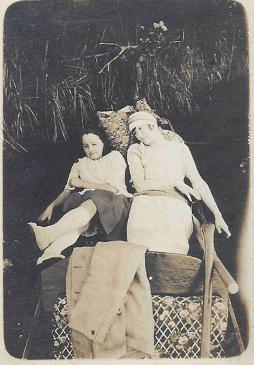
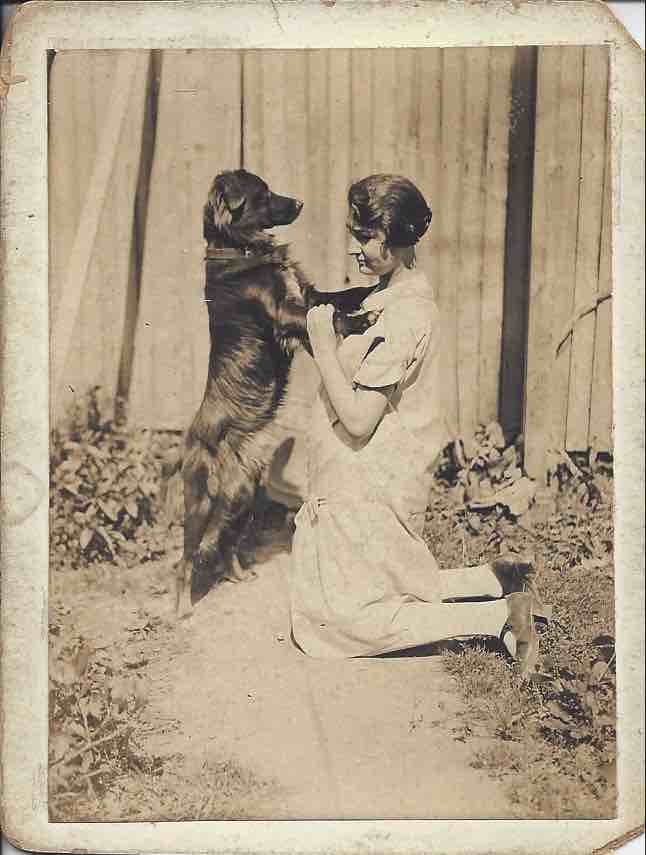
1924 - Bella (40)
I got a letter today from Belle with some terrible news - her little Rosie has died of diphtheria. She was only 6 years old.
Just two weeks ago Belle, her father and Rosie went down to London to stay with Belle’s sister for a holiday. They had only been there a few days when Rosie got sick and was taken into hospital but they could not save her. Belle says that there is a lot of diphtheria in London at the moment so it’s best if we don’t go down for the funeral.
We shall all miss little Rosie so much, especially Nellie who Rosie used to idolise and follow everywhere. I think I shall get Nellie to go in and sleep with Belle for a while to keep her company.
In her letter Belle says that she will probably move back to London now that she has lost Rosie. I wonder if perhaps we should go back too?
Belle Keeble was Bella’s great friend who had moved to Eynesbury at the same time (see 1922). Although Rosie did not die in Eynesbury, her death soured the idyll of life there and precipitated the move back to London in 1925.
December 1924 - Helen (13)
I’ve had a wonderful Christmas this year! Before Christmas I came up to London on my own to stay with Auntie Belle and Mr Freeth (her boyfriend). They took me to the Duke of York’s Theatre to see Nora Blaney. One of the songs she sang was ‘What’ll I do?’ (which is my favourite) and she was so good. I was so thrilled. We went early and lined up for the 3/6 tickets and buskers came down the line playing to us before we even got into the theatre. On Christmas Eve, Mum and the boys came up to London from Eynesbury and we all went to stay with Auntie Beat. Cousin Vin has got the sheet music for ‘What’ll I do?’ and he plays it on the piano. He is good, and we have done lots of singing this Christmas!
Summer 1925 - Helen (14)
All my girlfriends have gone out strawberry picking every day this week. A bus picks them up just down the road from us and takes them out to the strawberry fields each day. The money isn’t bad but Mum won’t let me go. She says only the lowest of the low go out picking! So I’m just hanging about at home on my own, which is what I have done most of the time since I left school last Easter. My teacher, Mr Jones (actually he is Captain Jones but we usually call him just Mr Jones) said I should have gone to Huntingdon Grammar so that I could be a pupil teacher and then a proper schoolmistress. But Mum said we couldn’t afford it so I left and got a job in the boot shop in the village for 4 shillings a week. I had a new overall to wear and my job was to dust all the shoes and keep the shop clean and tidy. After I had worked there for three weeks they sent me on a delivery and Mum was so mad that they had got me wasting shoe leather that she made me leave at the end of the week. I have not had a job since. Ernie is working though, as an odd job boy at Ireland’s garage and last week he saw the Olympic runner, Harold Abrahams there. It seems that he is a friend of the owners.
November 1925 - Helen (14)
Today we moved back to London to this flat in Victoria Road, Gypsy Hill. Bert and Ernie came with the van but Mum and I came on the train so that we could get everything ready before the furniture arrived. Our new flat is on the first floor of a big house and when Mum and I got here we were met at the door by an old lady with a candle. The rest of the house was in darkness and it looked so awful. Auntie Beat and Auntie Lettie came round to help and we lit a fire and brightened the place up a bit but I still wish we hadn’t come back. I loved Eynesford!
January 1926 - Helen (15)
Today it was really icy with frozen snow everywhere. When Mum and I were walking down Gypsy Hill she slipped and sprained her ankle really badly. I took her home and then went to the house in Alleyn Park Road where she works to let them know that she wouldn’t be in. Then I got on the number 3 bus to go to work myself. I was a bit late but they were all right about it. I have got a job working as an office girl at Williamson's in Brixton for ten shillings a week. It is a high-class grocery store called The Bonanza Stores. One of my jobs will be to check the receipts and they are teaching me to use something called a Boroughs Adding Machine to do it with. Ernie has got a job too, as an apprentice engineer for Peak Freans in Bermondsey and with Mum getting half a crown an hour for cleaning (she does two mornings - two hours each) we’re not too badly off.
1926 - Helen (15)
I heard someone talking on the wireless today for the first time. It was on a crystal set that my brother, Ernie, had made following instructions out of a book. He got all the parts round at the hardware shop. It only had one earpiece but he let me listen for a bit. It was amazing, but it was hard to hear what the man was saying. Ernie told Mum that he needed a cat’s whisker to make the crystal set. She thought he meant a real cat’s whisker and spent all day looking round the floor for one from our cat, Nimrod!
Mum has bought a gramophone, on the never-never. It is in a mahogany cabinet and you wind it up to make it play. We’ve only got a couple of records to play on it but my favourite is ‘What’ll I do? which reminds me of all the fun we had last Christmas.
It’s been raining non-stop all day today and I got absolutely soaked on the bus on the way to work. I always sit upstairs in the open, even when it is wet and most of me stays dry under the covers you can pull up over yourself but my new fawn felt hat got ringing wet and I put it in front of the coal fire at work to dry off. When it came time to go home I found it had shrunk and I can’t get it on. I really liked that hat and it cost me 6/11!
Easter 1926 - Helen (15)
It was Good Friday today and I went out for a little walk round Crystal Palace with Mr and Mrs Barker who live downstairs. It is the first time for three weeks that I have been out of the house because I’ve been in bed with the mumps. I’ve really been very poorly and I’ve been confined to the bedroom so that no one else would catch it. Ernie did not even come in to see me but Bert came to sit with me when he got back from school. He even bought me some sweets (with Mum’s money!) when he went out shopping for her, but I couldn’t really eat them at first because my throat was so sore.
The doctor came to see me a few times. The first time he came he was getting up from the chair when it gave way and he nearly fell on the floor. Fortunately, the arm of the chair was next to the bed so he was just able to save himself. Mum played hell with Ernie because he was the one who had broken it larking about with Rose and Wyn (our cousins).
I shall be fit enough to go back to Williamson’s after the Easter weekend I expect.
May 1926 - Helen (15)
The General Strike is on and I am staying with Auntie Belle in Brixton Hill so that I can walk to work. There are a few buses, run by the students, but it’s much safer to walk.
Today it is Wednesday and as usual we have had the afternoon off (most shops are closed on Wednesday afternoons). Because Auntie Belle was at work I went home to tea with one of the girls I work with. On my way back to Auntie Belle’s this evening I saw some of people coming home from the Derby in a pony and trap. The General Strike does not seem to bother those folks!
Since we have been back in London, Mum has renewed her friendship with Auntie Belle and we get together every Monday for supper. One week Auntie Belle and Mr Freeth come to us, and the next week we go there. Mum usually meets me from Williamsons, we go to collect Auntie Belle and Mr Freeth from United Dairies (where she works) and then we all call in at a pub for a drink on the way back to Auntie Belle’s. My favourite drink is a small port and lemon.
Summer 1927 - Helen (16)
I went to Brockwell Park today to play tennis with my cousins Gladys (who took this photograph) and Winnie, their neighbour who is French and a French girl who is staying with her for the summer to learn English (she is the one on the left). It takes about 35 minutes to walk to Brockwell Park from our house in Gypsy Hill, but it was a lovely day so I didn’t mind. There is a bus but I wouldn’t dream of spending the money for just that short distance. My tennis dress is made of shantung and I really love wearing it.
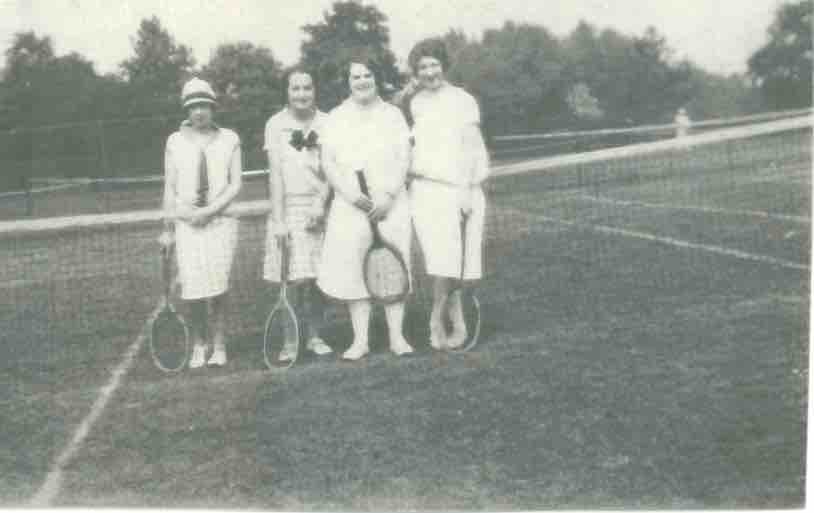
September 28th 1929 - Helen (18)
I went for a new job today. Last week I saw an advert in the paper for an assistant in a wireless shop in Savoy Street. I wrote to the proprietor, a man called Mr Barnard and he wrote back offering me an interview today. Mum and I went up on the train but she didn’t come in to the shop with me when I went for the interview. Mr Barnard seemed a very pleasant man and he has offered me a job right away. I start next Monday, October 1st. I have already met one of the people who works for Mr Barnard. He is called Tom and he is about the same age as me. He looks nice and he has beautiful golden hair. He was serving behind the counter when I went in and he was obviously expecting me because all he said was, ‘Come this way’.
The reason I have got a new job is that I packed it in at Williamson's. I started at Williamson's in Brixton in 1926 when we came back to London. I was on ten shillings a week. It was all right there, but when they moved me to Herne Hill it was much better because it was not so far to travel and I could go home for lunch. By the start of this year I was on seventeen and six a week. But then in July they moved me back to Brixton and although they did give me free meals on top of my wages, as the meals weren't very nice I didn’t really gain anything. I kept moaning about it and Mum said, ‘Well, leave then!’ So I did.
I went out with Tom tonight for the first time. We went straight from work to the Elephant and Castle and had mash and eels for our supper in the eel shop under the arches. Then we went to the Trocadero Cinema (just opposite) in the one-and-three-penny seats. He bought me a bar of Terry’s chocolate.
1930 - Helen (19)
Today I brought Tom home to meet Mum. He was all shy and sat on a chair right by the door. She made us some tea then we went to the pictures at the Regal in West Norwood. After Tom had gone she called him a ‘German Square Head’ but she must like him a bit because she hasn’t objected to me going out with him. He got on very well with Ernie and Bert. I hope they will be good friends.
Summer 1931 - Helen (20)
Tom and I have just returned from a wonderful holiday in Bournemouth. We stayed for a fortnight in a guesthouse where we paid 2 guineas per week each for full board.
We had some lovely weather and spent many sunny days on the beach. In the first couple of days the sun was so hot that I burned my face and shoulder so I had to buy the big hat I am wearing in the photograph. Tom went swimming in the sea but I can’t swim so I just paddled at the edge.
We went on a few coach trips, the best being to the Cheddar Gorge. When we were down in the caves the lights broke down and we were left in total darkness. Fortunately the guide had a strong torch but it was a very eerie experience all the same. We also had a day out to Weston-Super-Mare where we met Mr and Mrs Seals for lunch and spent a happy afternoon with them.
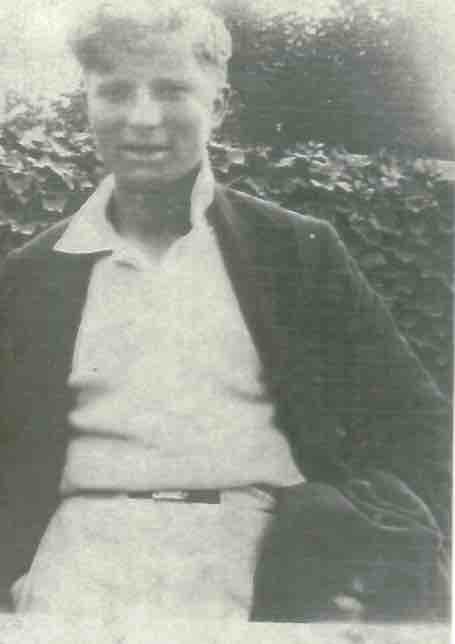
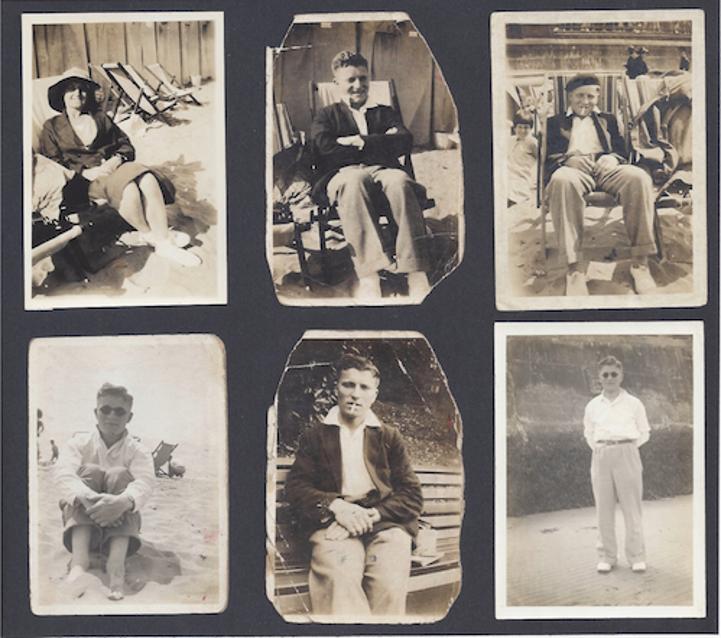
February 3rd 1932 - Helen (21)
Today is my 21st birthday. It has been a normal working day so I have not done anything special. I haven’t even been out this evening although I have had a nice time talking with Phoebe (who came round) and with my cousin Ly who is staying with us at the moment because her husband is in the sanatorium with T. B. Tom came round too for his tea but he and the rest of the boys (Ernie, Bert, Vin and Harold) went round to the billiard hall as soon as we had finished and we didn’t see them again until bed time!
I have had some lovely presents. Tom bought me a dressing table set in blue enamel on silver. It has a hairbrush, a comb, a hand mirror and a clothes brush and is very pretty. Ly bought me a lace yoke, which I am planning to make up into a nightdress, and best of all Mum and the boys bought me a treadle sewing machine. It cost 20 guineas and it is just the latest thing. I have been learning dressmaking at evening classes at Norwood Tech ever since I was 18. I have already made some really nice clothes there but now I shall be able to make them at home.
The card from Tom has 21 kisses - this seems to be his trademark as Helen alos kept cards with 22, 23 24 etc kisses.
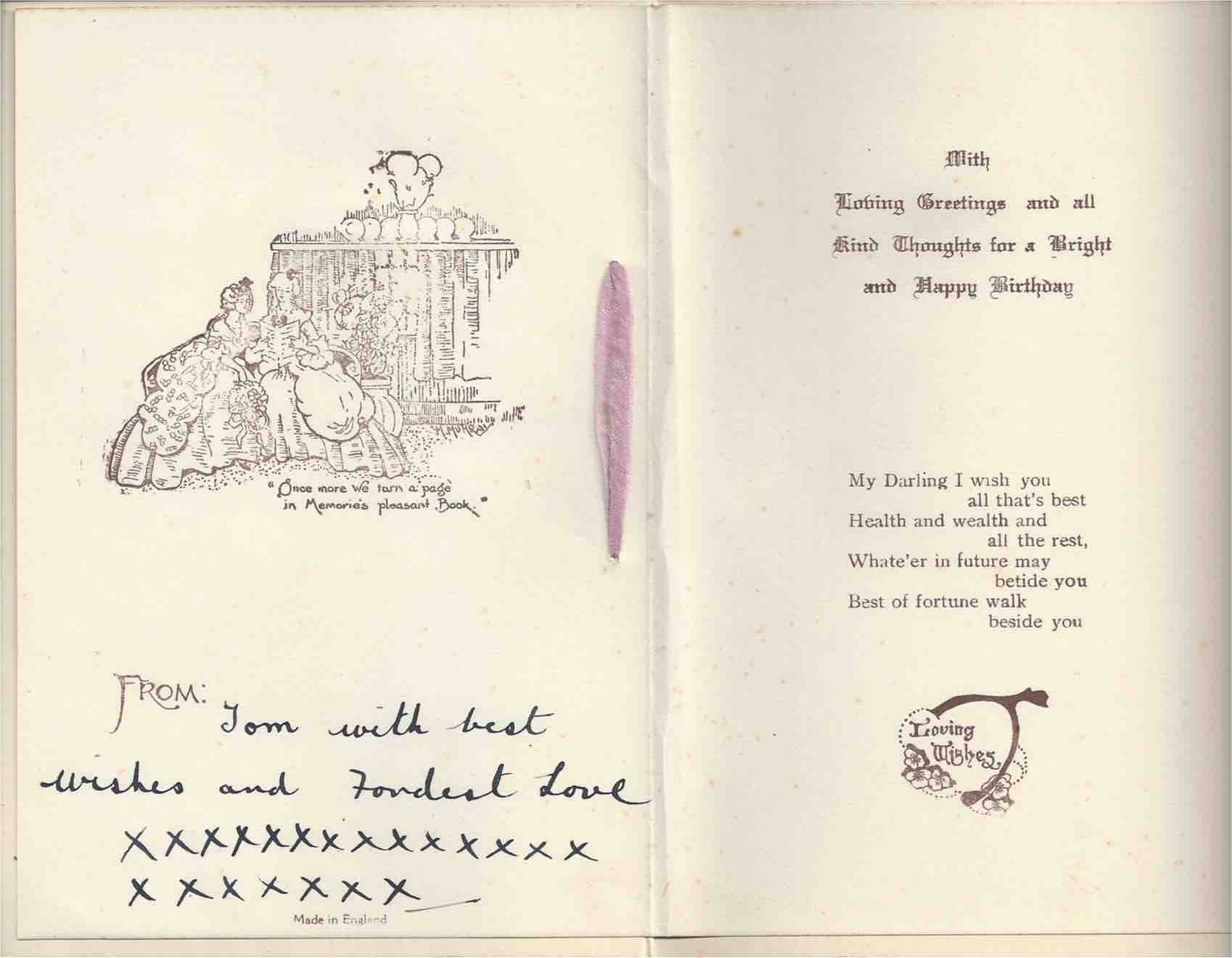
Summer 1933 - Helen (22)
Today Tom and I went on a day trip to France to see my Dad’s grave. (It is the second time we have been - the first was two years ago.) We are staying at a guesthouse near the pier in Margate for our holiday and we caught the Queen of the Channel, which sails every day from London to Calais stopping off in Margate. We had a lovely lunch on the way over - fresh salmon and cucumber - and when we landed we looked for a cab to take us to the cemetery. Amazingly it was the same cabby who took us last time, a real French looking man with a huge moustache, who fortunately could speak some English. Last time he took us to all the village cemeteries before we finally found the right place but this time he knew us. He said, ‘I’ve taken you before!’ and he took us straight to the military cemetery. The graveyard is beautifully kept with hundreds of graves in straight rows. There is a chapel and it is there that they keep the book showing where each soldier is buried. We found Dad’s grave easily and gave the caretaker some money to put flowers on it for us.
Photo shows Helen amongst the graves in Les Baraques Military Cemetery in Sangatte
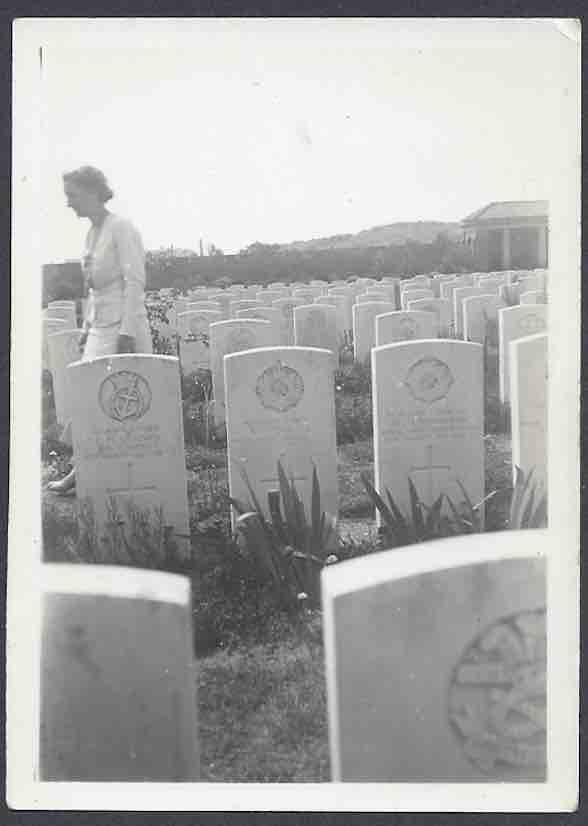
1934 - Helen (23)
When I was a Shortland’s I had to get a tram at ten or twenty past six every morning to be there for a 7am start and I didn’t finish until 6pm (or 1pm on Thursday). Even Saturdays it was 7.30 to 5pm. Here at Hayward Bros it’s 7.45am to 4.30pm and 8am till 12.30pm on Saturday. I’m getting the same wages as when I was at Shortland’s (35/-) but my tram fare is less, so I’m better off. The early morning fare (workman’s fare) to Kennington is 4 pence return (after 8am it goes up to 3 pence each way).
Also I like being a telephonist much more than a clerk. Originally I had applied to be a ledger clerk here just like I was before. However, the interviews were on Wednesday and I couldn’t come until Thursday, which was my half-day at Shortland’s. When Mr Hayward interviewed me on Thursday he told me that the clerk’s job had been taken the day before but there would be a job as a telephonist free the first week in August as the girl who did it was leaving to get married. I had been doing some telephone work at Shortland’s (taking orders and so on) so I was happy to take the job and to stay on at Shortland’s for the extra six weeks until it became vacant.
I hope this job is going to last. We have all had a very unsettled time since Barnard’s shut down last year. Mr Barnard went broke and we were all out of work. Tom and Ernie took over another of Barnard’s shops in Coldharbour Lane selling wireless and electrical equipment and tools, and I went along to help out at Barnard’s other shop in Hamilton Road (without pay!). But Ernie and Tom went bust so Ernie took over at Hamilton Road, Tom got a job driving HGV for Parkes and I was out of work for a while until I found the job at Shortland’s. Tom is paying back his debts on the Coldharbour Lane shop at the rate of £1 per week (which is about a quarter of his wages) so I can’t see any likelihood of us being able to get married in the near future.
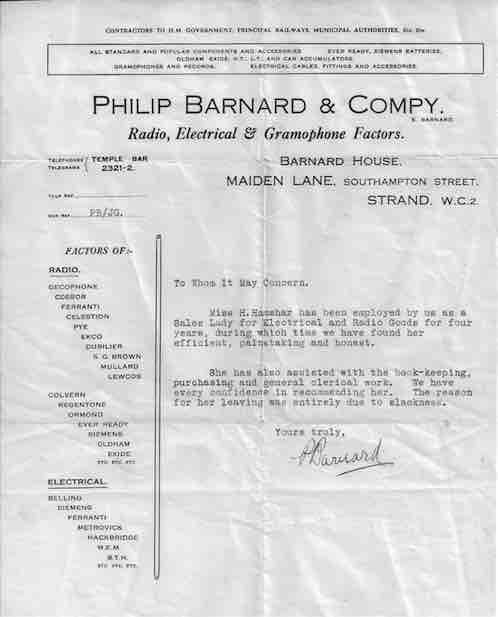
1934 - Helen (23)
We have just come back from paying out last respects to my Grandma who is laid out at Doris’ house in Knollys Road. (Uncle Guilly is her only surviving son so they are handling the funeral arrangements.) She was laid in her coffin on the dining table and looked like she was made of marble. I didn’t want to even look at her but Mum made me go and kiss her on the cheek.
Grandma died suddenly yesterday. She had been round to Auntie Lettie’s for a meal and as she was opening the door to leave she collapsed and died of a stroke. She was 87 years old, which is a good age. The family has been teasing her for years about when she was going to go and let them claim the insurance (I think that everyone but us had her insured). She has lived in a single room in Harpenden Road for some years and Mum is going round there tomorrow with Lettie to help clear it out.
I was never terribly fond of her and she was never much of a Grandma to us when we were children. I don’t think she ever gave me more than a penny! She was a handsome woman, though, and we were all always proud to say, ‘That is my Grandma.’ She always wore black with a high straight black bodice and a black bonnet with some frizzy hair sticking out at the front and sides. I can’t ever remember seeing her without her bonnet - until now when she is lying in her coffin without it. She will be buried at the weekend in the new Streatham Cemetery.
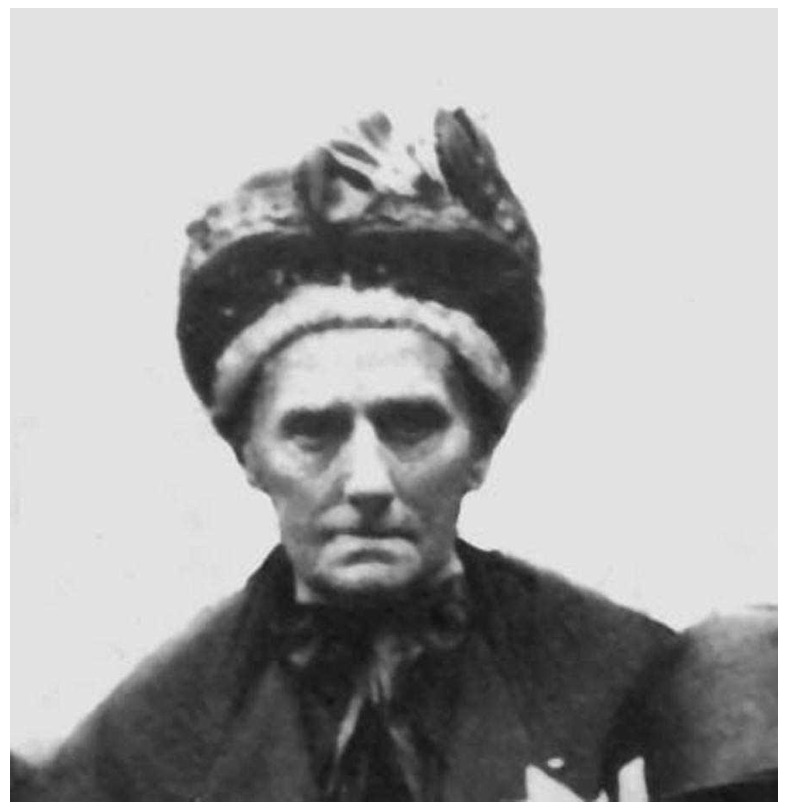
This photo came to me in 2018 through a contact on Ancestry Mike Hoare. It shows Emma Hamshar (nee Vincent) in 1927 at the wedding of her grandson William Richard Hoare. The hat does not quite fit Helen’s description but it was a special occasion!!!
31st March 1936 - Bella (52)
Today we have moved back to Ullswater Road! I have taken out a tenancy on 17 Ullswater Road which is quite large with nine rooms and so I shall be able to sublet quite a bit of it and still leave us as much space as we have here in 11, Dalmore Road. It is up at the top end of the road but on the same side as The Mansions where we used to live. Ernie had to sign the papers with me because a woman cannot take out a tenancy on her own. I shall get the telephone put in as soon as possible and they have said that we can keep the same number that we had at Dalmore Road 670-2840.
We have only been in Dalmore for a couple of years. We moved there from The Mansions when my cousin and her husband took a pub off Russell Square. They decided to let out their house and gave us first shout for the ground floor and semi-basement. That was a lot more space than we had in the little flat in The Mansions so I jumped at the chance. But now it makes a lot of sense to get a place of my own so that I can get some income from the lettings.
The house - and the telephone number - remained that of the Goviers until the house was sold in 2003,
26th September 1936 - Helen (25)
Today I was chief bridesmaid at the wedding of my cousin Doris. She married John Anthony. The wedding was at St Luke’s Church in West Norwood and the reception afterwards was at the British Legion, which is where all the photographs were taken. John’s brother, Leslie was best man and there were 6 other bridesmaids including Doris’s sister Ivy who is a mongol (now known as Down’s Syndrome).
I made my own dress though Doris bought the material (3/6 per yard). I go each week to dressmaking classes at Norwood Tech and I made most of it there.
Helen is on the bride's right. Ivy is on the far right of the photograph.
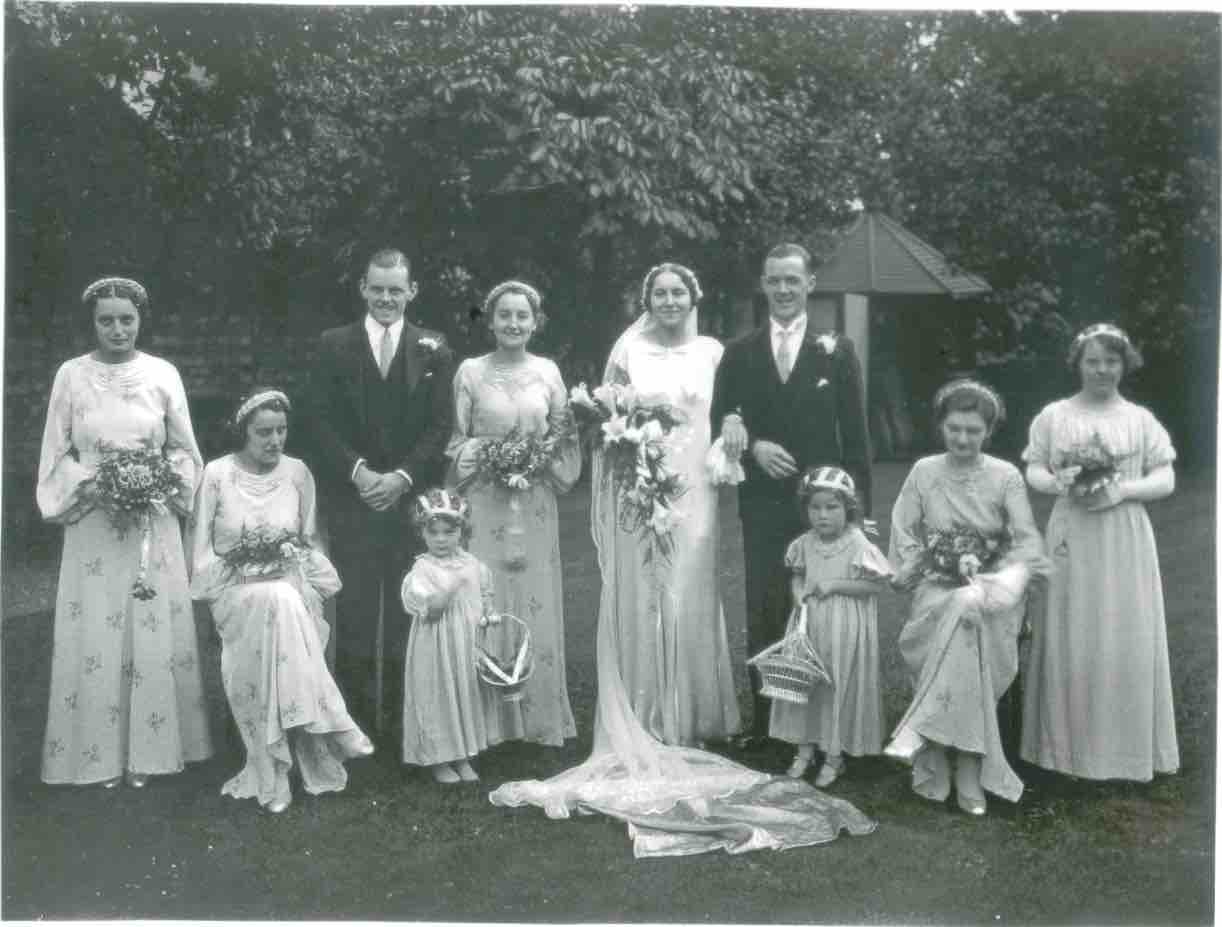
Summer 1936 - Helen (25)
It was the Silver Jubilee of George V and Mary and a lovely summer’s day and I went with Tom, Mum and Ernie on the bus to Buckingham Palace to see the king and queen on the balcony waving to the crowds. We were too late for the procession but we saw the royal family make two appearances. There was a long time between them but it passed in a jolly way as the crowd was very friendly and we found lots of people to talk to. We stayed until it was beginning to get dark and then everyone started coming away. The crowd was flowing along nicely until a group of youths came pushing the wrong way and there was a terrible crush. Ernie got in front of Mum and Tom in front of me but it was very frightening and I thought we were going to be crushed to death.
Monday 30th November 1936 - Helen (25)
Tonight the Crystal Palace is on fire.
At Hayward’s, in Kennington, where I work, we have a club on Monday nights in the works canteen. All the tables get pushed back to make room for dancing or there is table tennis for those who’d rather play that. We had the gramophone on (playing our favourite waltz) but some of the others were listening to the radio and they heard the news flash that the Crystal Palace was on fire. We all went up onto the roof and you could see the red glow quite clearly even all that distance away.
Tom was there too, which is unusual. He’s not too keen on dancing and so he doesn’t usually come to the club but tonight he came because he was feeling disappointed at having been turned down as a bus driver. He had passed all the tests including the driving but failed the medical because his arm is not straight after his accident (he tore his arm on a wire fence a couple of years ago).
After the club he took me home and you could smell the fire in the air when we got to Norwood
1937 - Bella (53)
I have had the man from the Electric Light Company round today. I am going to get electric lights in all of the rooms to replace the gas and I shall have a power socket in the scullery so that I can buy a Creda electric stove, a Goblin vacuum cleaner and an electric iron. Then I shall really be in the modern age.
The photos below are the last portraits of Bella (left) and Helen (right) in this section of the 20C Diary. Helen's photo - probably given to Tom - is signed “with all my love Nellie”. Helen was called Nellie all of her life, although she did not like the name and would much prefer to have been known as Helen. For that reason she is Helen throughout this diary - she got her wish after her death.
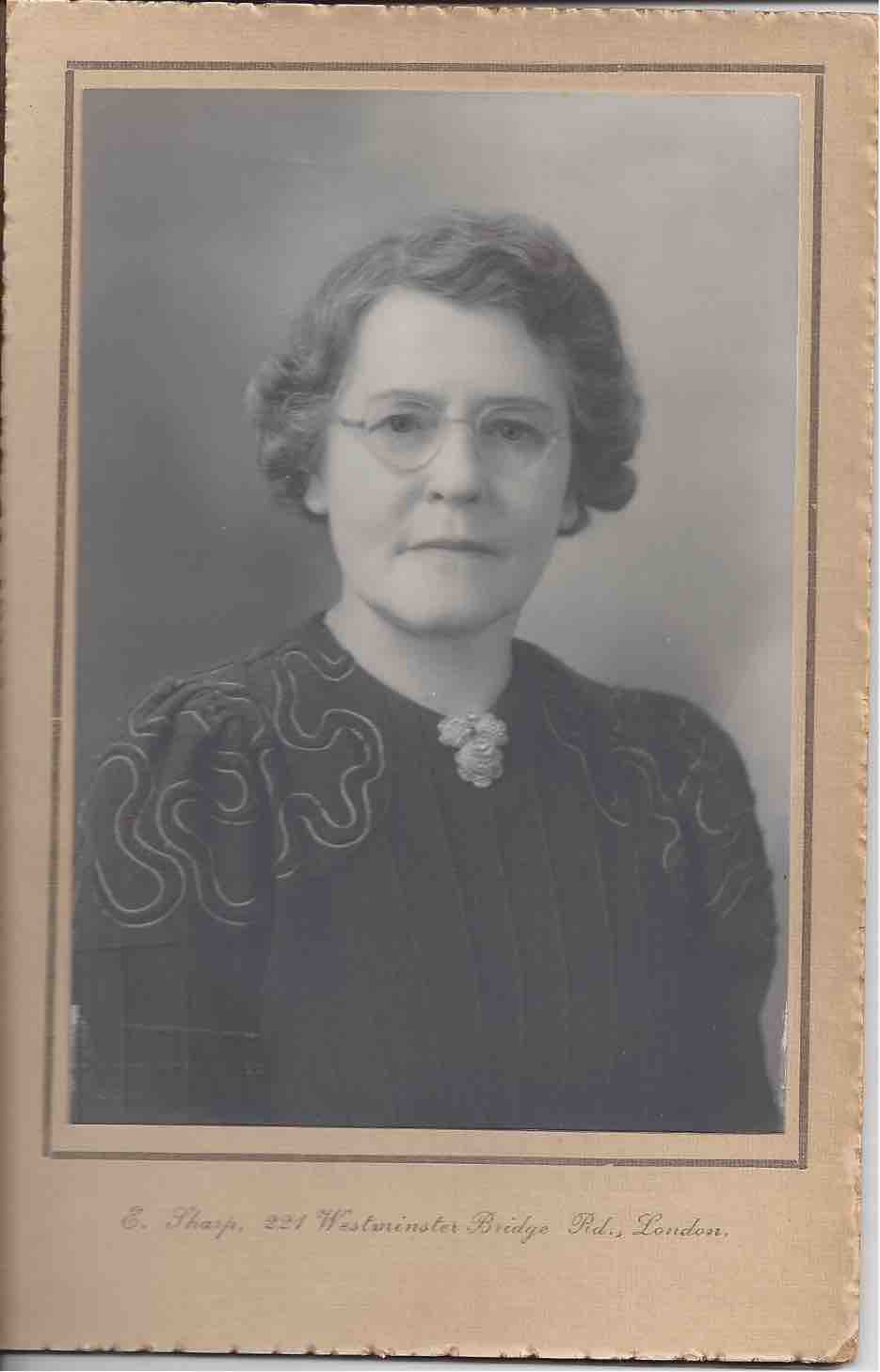
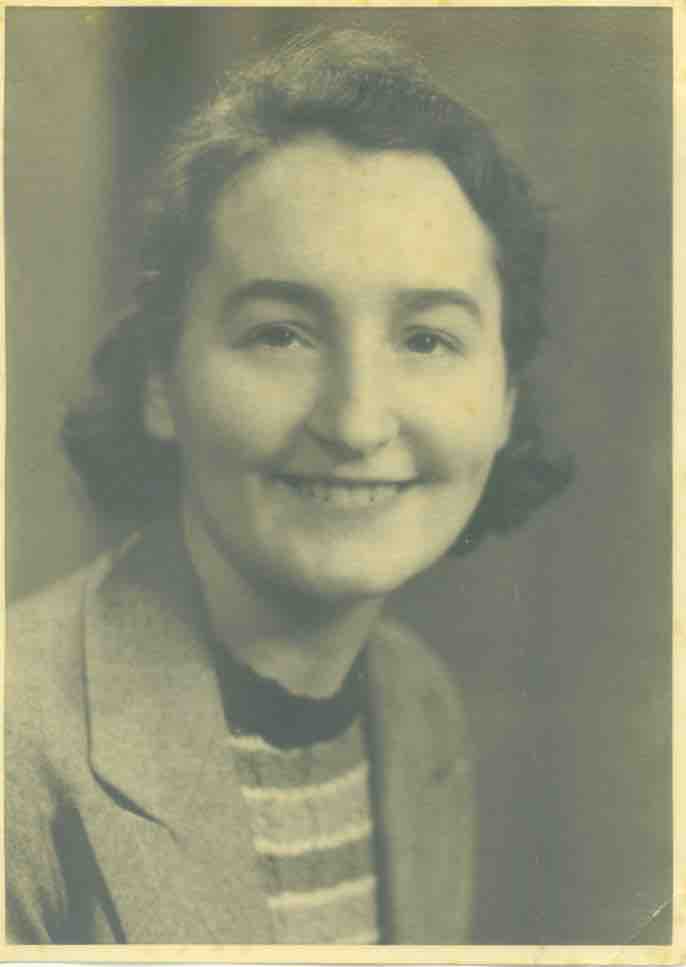
Doris’s baby was born today at their home in Knollys Road. It was a little girl and they will call her Pamela. Mum went round to help but I shan’t go till tomorrow when I will take the shawl I have knitted for her. Auntie Emily (Doris’ Mum) told us that Doris wasn’t at all pleased when she found she was pregnant - said she wasn’t ready to have a baby yet and John should have been more careful!
3rd September 1938 - Helen (27)
Today Tom and I were married.
This marks the end of this section of the 20C Diary. To be continued in due course as the Govier-Hamshars.
In the photograph Bella is standing behind Tom & Helen, Ernie (Helen's brother) is second from the right (wearing glasses) and Bert (Helen's adopted brother) is second from the left.
